Most U.K. Political Leaders Are Cautiously Welcoming Trump. Not This One.

© Mary Turner for The New York Times


© Mary Turner for The New York Times


© Kenny Holston/The New York Times


© Loren Elliott for The New York Times


© Desiree Rios for The New York Times


© Mark Schiefelbein/Associated Press


© Doug Mills/The New York Times


Estonia has imposed temporary flight restrictions along its entire eastern border following increased military activity in Russia’s Leningrad region, according to ERR.
The restrictions, which affect flights up to 6,000 meters altitude, will operate nightly from 8 PM to 7 AM for the coming weeks. The measure responds to heightened activity from Russian forces and Ukrainian drones operating in the border area.
“We are only restricting part of aviation activity. In simple terms, this means that those who contact us and justify their actions, like the Police and Border Guard Department last night when they searched for a missing person using a drone, can continue working,” explained Estonian Air Force Commander Riivo Valge.
The flight ban aims to reduce the number of objects air surveillance operators must track.
“If an incident occurs, it will be easier to remove civilian aircraft from the zone or land them,” Valge added.
Estonia’s Defense Forces will conduct detailed air surveillance, training exercises, and flexible airspace protection in the region over the coming weeks. The restrictions followed the closure of St. Petersburg’s airspace due to drone attacks on 11 September.
“We received information that Petersburg’s airspace was closed due to an attack. We carefully observed Russian aircraft and helicopters near our borders and strengthened our surveillance capabilities. This happened last night,” Valge said.
The measures initially affected the Helsinki-Tartu airline route. Air Traffic Control Service representative Mihkel Haug noted that information arrived unexpectedly and rapidly Wednesday.
“Our goal is passenger and pilot safety. Therefore, the initial measures were strict. Today we reviewed the restricted zone, discussed with the Air Force the part of the zone needed by Finnair for Tartu flights at certain hours, and made it free,” Haug said.
Finnair confirmed it can operate under the modified conditions after the Air Force officially changed the restricted zone boundaries.
Estonia’s Defense Forces maintain their threat assessment remains unchanged, with no direct or immediate military threat to the country. However, the region has experienced increased air incidents caused by Russia’s military actions against Ukraine.
Finland and Latvia have introduced similar flight restriction zones in their border areas.
On 25 August, a farmer in Estonia’s Tartu County discovered fragments of a strike drone with an explosion crater at the site. Security Police assessed the drone crashed in Estonia early Sunday morning and may have been Ukrainian.
The drone attacks targeted objects in St. Petersburg and the oil terminal at Ust-Luga port near Estonia’s border. Multiple Russian airports introduced restrictions and airlines modified their schedules in response to the incidents.
Military officials say it remains too early to determine how long the flight restrictions will remain in place.


© Erin Schaff/The New York Times


© George Frey/Getty Images


© Elizabeth Frantz for The New York Times


© Elizabeth Frantz for The New York Times


© Doug Mills/The New York Times


© Ash Ponders for The New York Times


© Doug Mills/The New York Times


© Tierney L. Cross/The New York Times


© Eric Lee/The New York Times
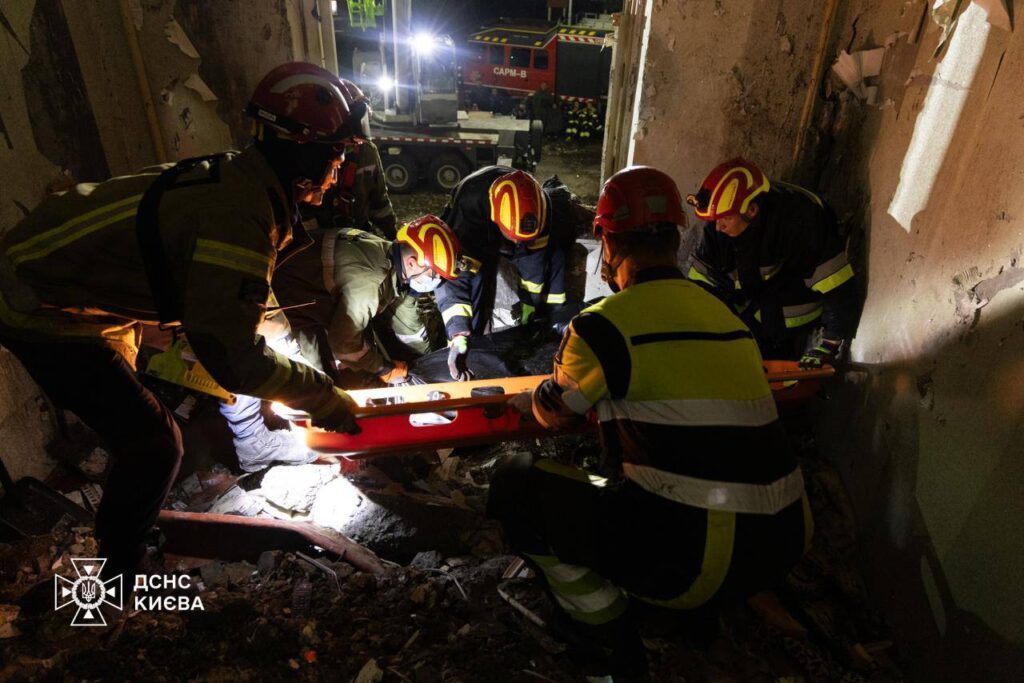

Ukrainian rescue workers pulled the body of a third victim from the rubble of a destroyed nine-story apartment building in Kyiv, bringing the total death toll from 7 September massive Russian attack to three people, according to the State Emergency Service. The man was not yet identified.
In Kyiv, the attack caused severe damage to the nine-story residential building in Sviatoshynsky district and hit a four-story building in Darnytsky district. The Cabinet of Ministers building also sustained damage.
The two other victims were identified as 32-year-old Viktoriia Hrebeniuk, an employee of charitable organization “100% Life,” and her two-month-old son Roman.

Her colleague Yulia Melnyk described Viktoriia on Facebook as “an incredibly kind, decent and wonderful person” whose support, leadership and professionalism would not be forgotten.
Her friend Maryna Novak wrote that Hrebeniuk “had just received such a dream life, family, husband, little son” and “loved life and people above all else.”
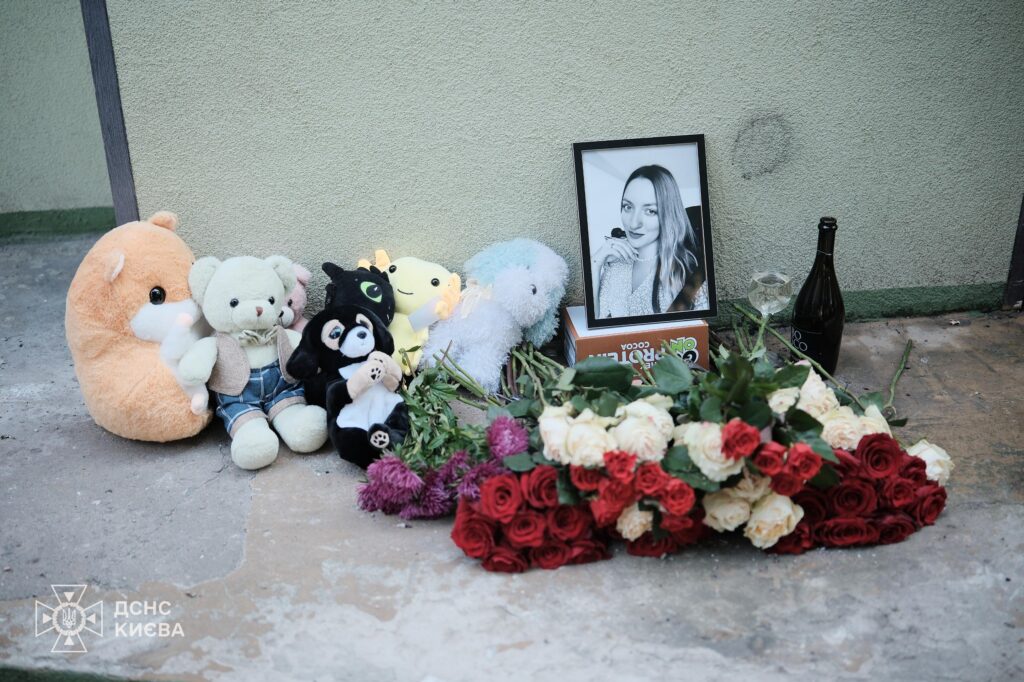
Twenty people were injured in the capital, with seven requiring hospitalization. Among the hospitalized is a 24-year-old pregnant woman in extremely serious condition who underwent emergency delivery after the attack. The premature infant is currently in intensive care, according to hospital officials.
Four patients remain in critical condition in the burn unit, including the new mother and elderly residents aged 72 and 74.
Search and rescue operations have ended at the partially destroyed apartment building where Russian strike killed three people.
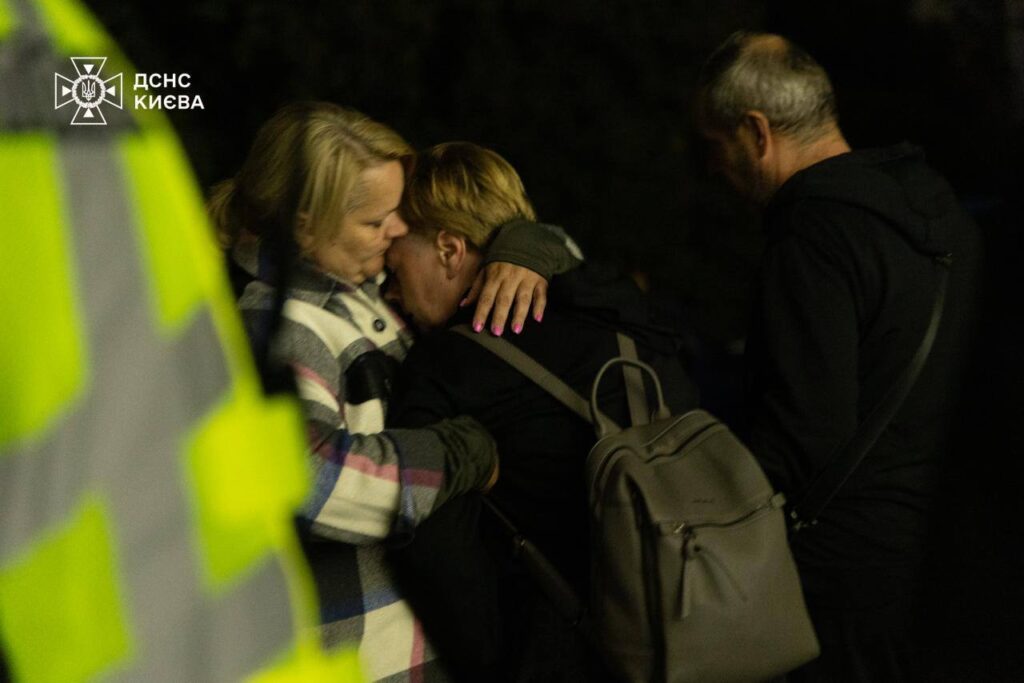
Meanwhile, President Trump expressed clear frustration with the escalation of Russian attacks on Ukrainian cities following the assault.
“I am not thrilled with what’s happening there,” Trump said of Russia’s attacks. “I believe we’re going to get it settled. But I am not happy with them. I’m not happy with anything having to do with that war.”
The president indicated he plans to speak with Putin in the coming days about ending the war.


© Navesh Chitrakar/Reuters
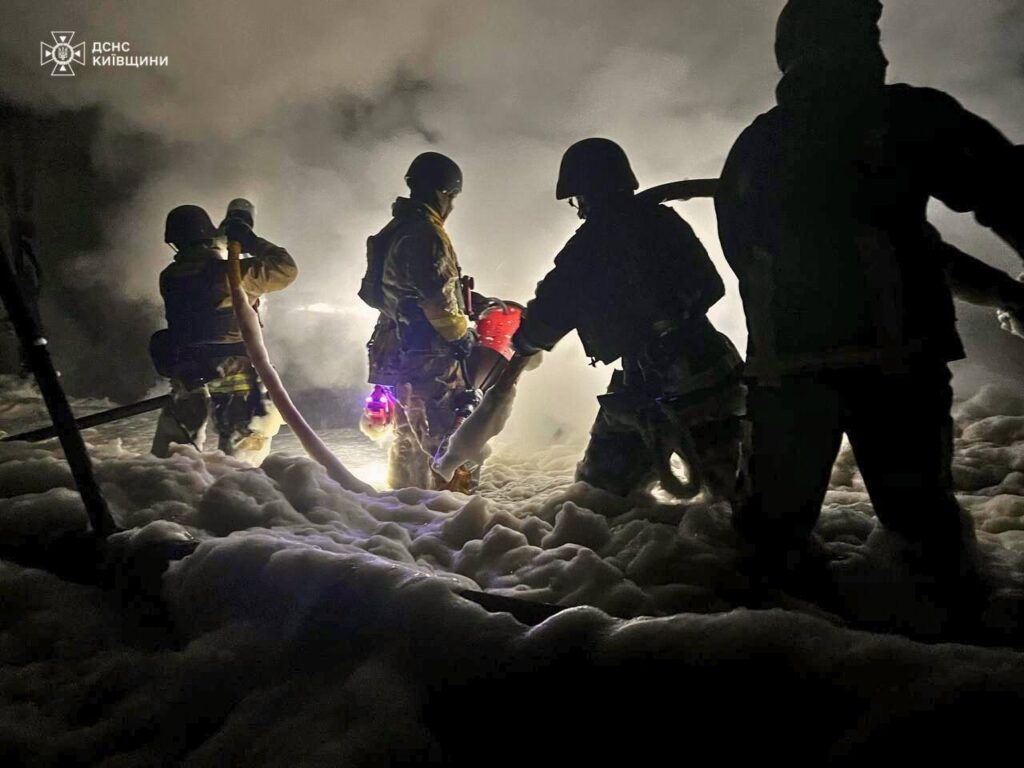

Russia conducted another large-scale aerial attack on Ukraine during the night of 8 September, deploying 142 strike drones across multiple regions and damaging civilian infrastructure and energy systems.
The attacks on 8 September involved Shahed-type drones, “Gerbera” drones, and other unmanned aircraft launched from four separate directions. Ukrainian defense forces successfully intercepted 112 of the attacking drones, according to the Air Force Command.
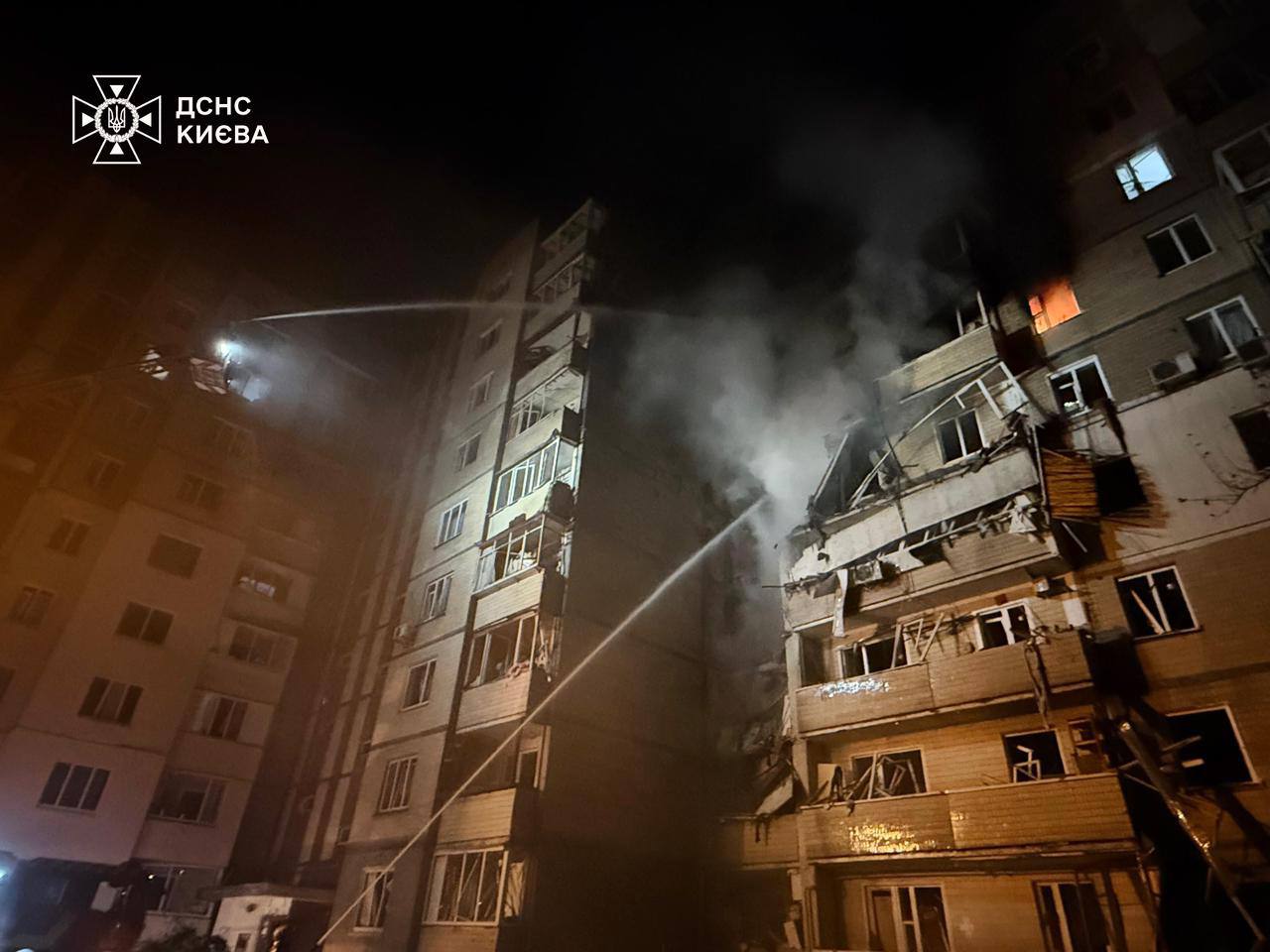
Russian drones specifically targeted Ukraine’s energy sector, with one thermal generation facility in Kyiv Oblast coming under what the Ministry of Energy described as “massive Russian shelling.”
The ministry stated that the attack aimed to “cause even more difficulties for the peaceful population of Ukraine, to leave Ukrainian homes, hospitals, kindergartens and schools without light and heat.”
The Ministry of Energy emphasized that generation facilities, electricity transmission and distribution systems, and gas infrastructure are civilian rather than military targets.
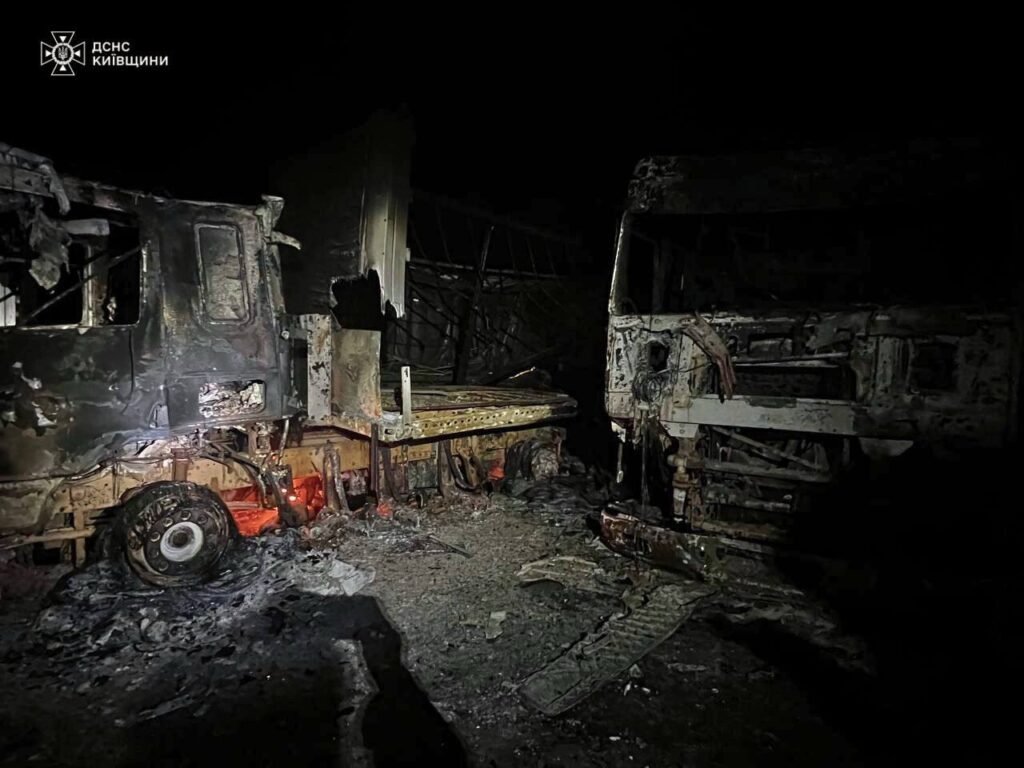
In Kyiv Oblast, the attacks resulted in a fire at an industrial enterprise, which rescue teams successfully extinguished without casualties. Blast waves also damaged a shopping center and fitness club in the vicinity.
Dnipropetrovsk Oblast in eastern Ukraine experienced separate attacks on Pokrovska, Mezhivska, and Bohdanivska communities. The strikes ignited fires at a fire protection administrative building, a kitchen and an outbuilding at a private residence, the State Emergency Service reported. No casualties were recorded in these incidents.
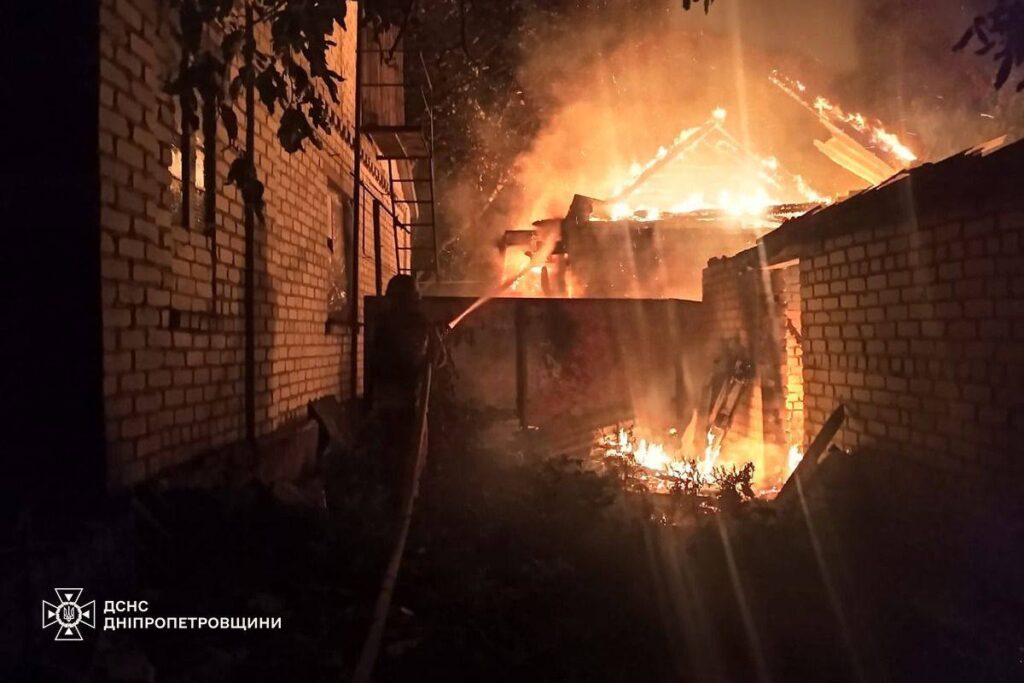
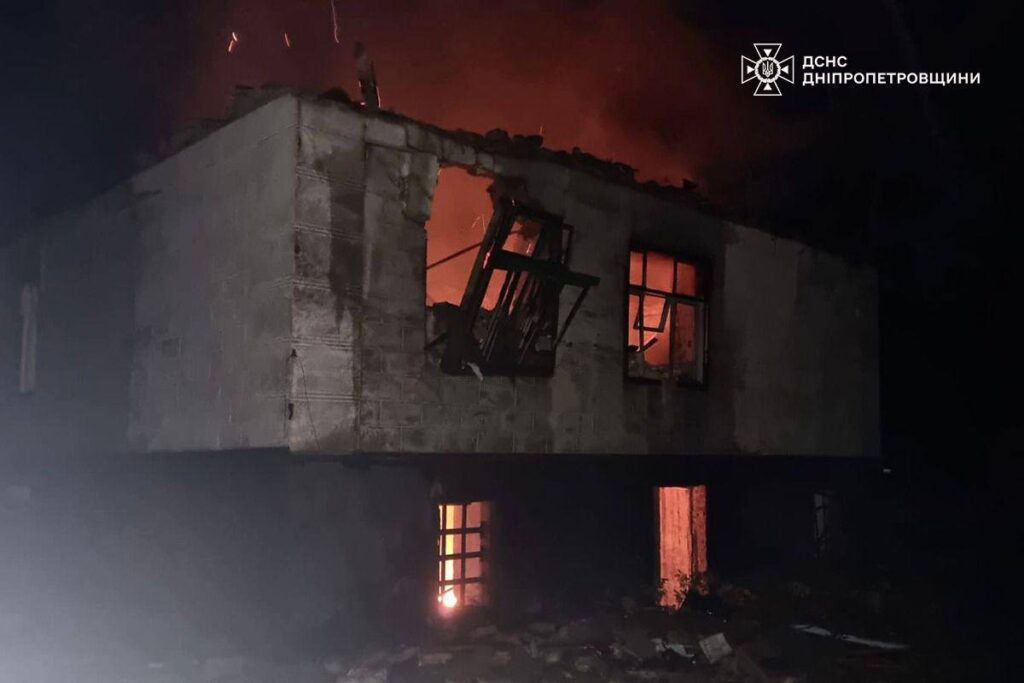
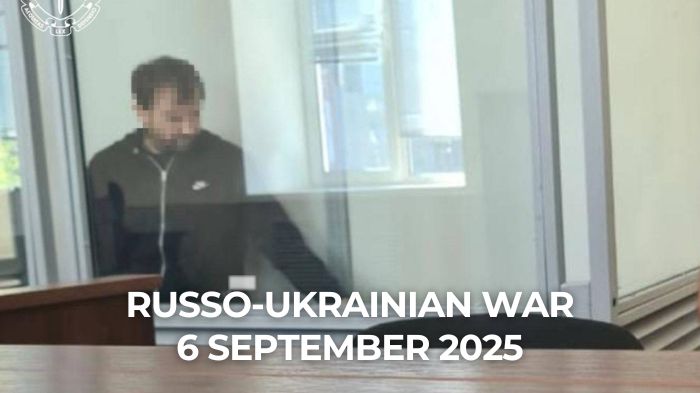

 |
Decade-long campaign of assassinations: six outspoken Ukrainian voices eliminated for anti-Russian position. From a Crimean Tatar activist to an elite intelligence officer and former parliament speaker, each killing bears Russian fingerprints that demonstrate Moscow’s deadly reach inside Ukraine. |
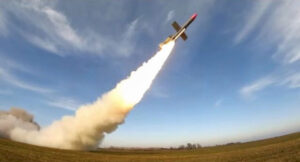 |
To make a Flamingo missile, pack in old bombs & add a tiny engine. The Flamingo missile’s best features are under its skin. Powerful and affordable, the missile could change the deep-strike math for Ukraine. |
 |
Canada’s pension cash is moving Putin’s $ 4 billion gas cargoes—end it now. Backed by Canadian pension money and Chinese firms, Arctic tankers carried billions of Putin’s gas across NATO waters last year. |
Ukraine’s special forces evacuate soldiers who survived three years hidden from Russian forces on occupied territory. The soldiers concealed their military identities with help from hospital staff who hid them from Russian forces throughout the occupation.
Ukrainian forces down 68 of 91 Russian drones in overnight assault. Russia launched 91 drones overnight, prompting Ukrainian forces to shoot down the majority while 18 drones struck targets in 8 different areas.
Zelenskyy: Ukraine secures backing from 26 nations for post-war peacekeeping force. The commitment includes both troop deployments and long-term military financing.
Hungary’s FM hits back at Zelenskyy: “We don’t care what Moscow thinks about Ukraine”. A diplomatic spat erupted between Kyiv and Budapest after Zelenskyy questioned Hungary’s stance on EU expansion, prompting Szijjarto to declare that Hungary “is not interested in what they think in Moscow about Ukraine’s EU membership.”
Polish protesters end 2.5-hour blockade of Ukraine truck crossing at Medyka-Shehyni
. Polish protesters lifted their blockade of Ukrainian truck traffic at the Medyka-Shehyni border crossing after holding up freight vehicles for 2.5 hours, with 681 trucks waiting in electronic queues during the disruption.
Russia can produce up to 2700 Shaheds per month – intelligence official. Ukraine faces “truly massive attacks” from hundreds of Russian drones as Moscow’s monthly Shahed production hits 2,700 units, creating what intelligence officials call a “serious challenge” for air defense systems.
50,000 Ukrainian children forced through Russian “patriotic education” programs, British Intelligence reports. Ukrainian children from occupied regions are being transported to Russian universities for “patriotic education” aimed at instilling anti-Ukrainian views and glorifying Russian military actions
Civilian woman thrown from her house by blast wave in Russian attack on southern Ukraine. The late evening drone attack on Zaporizhzhia also destroyed 80% of the kindergarten building, while damaging multiple homes.
Ukrainian-Polish teams re-bury 42 remains found in Ternopil village
. Eight years after imposing a moratorium on exhumations of Polish citizens in Ukraine, officials from both countries held a memorial ceremony in Puzhnyky
Russian drone scatters fake 100-hryvnia notes offering payment for military intelligence in Chernihiv. A Russian drone operation targeted a Chernihiv neighborhood with fake currency leaflets on 6 Sept., offering monetary rewards to residents willing to provide coordinates of Ukrainian military positions
Ukraine retrieves former politician hiding in UAE. He is charged with high treason for spying for Russia. The suspect, identified by Ukrainian news agencies as Fedor Khrystenko, is also accused of having ties in Ukraine’s anti-corruption agency.
Trump: Europe should play leading role in security guarantees for Ukraine. The United States will assist Ukraine but European countries should take the primary role in providing security guarantees, President Trump announced during a White House briefing
“Find a new job”: Trump’s retort to Polish reporter’s Ukraine war query. Polish journalist Marek Wałkuski questioned US President why no concrete actions had been taken to end the Ukraine war despite repeated promises, prompting Trump to suggest he “find a new job.”
Read our earlier daily review here.
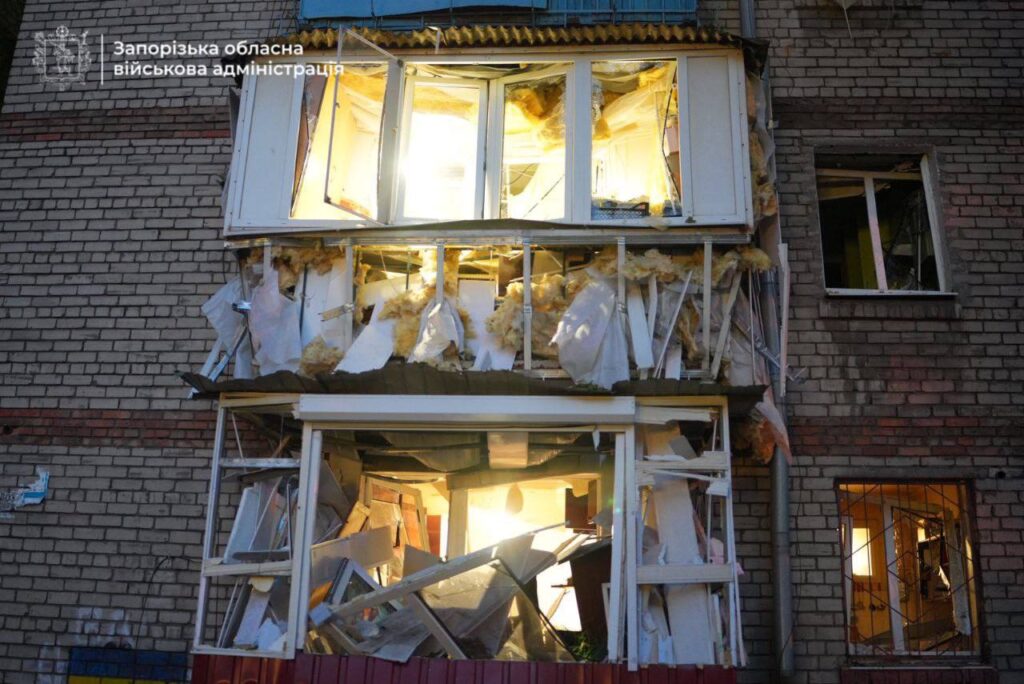

Seven Iranian-designed Russian Shahed drones struck the Ukrainian city of Zaporizhzhia on 6 September evening, leaving fifteen people wounded and reducing a kindergarten to rubble.
The attack unfolded around 9 p.m. as residents heard the familiar buzz of approaching drones. Viktor watched from his second-floor window as one headed straight for his neighborhood.
“I saw the drone flying, I thought it would fly straight into the roof,” he told Suspilne Zaporizhzhia.
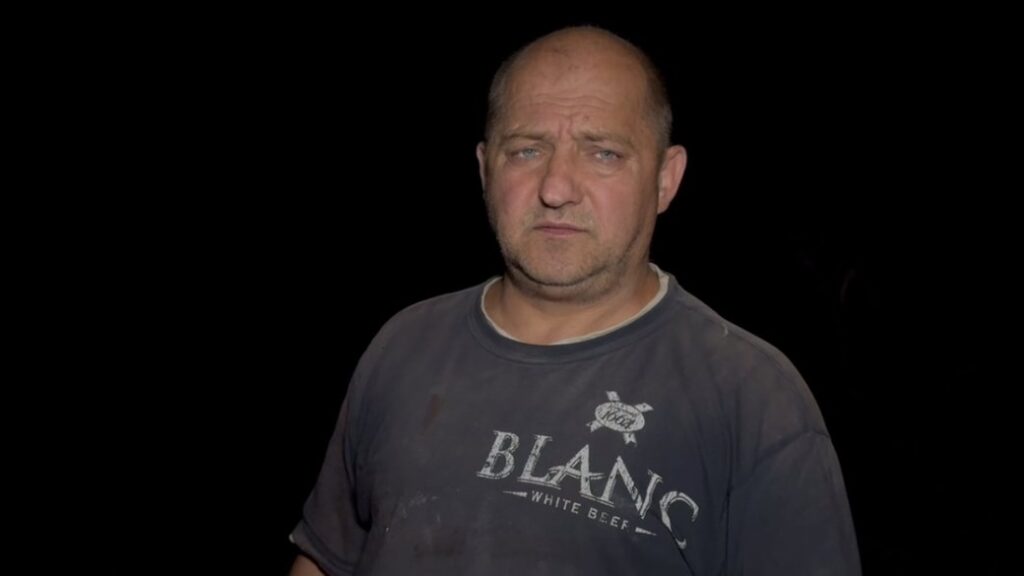
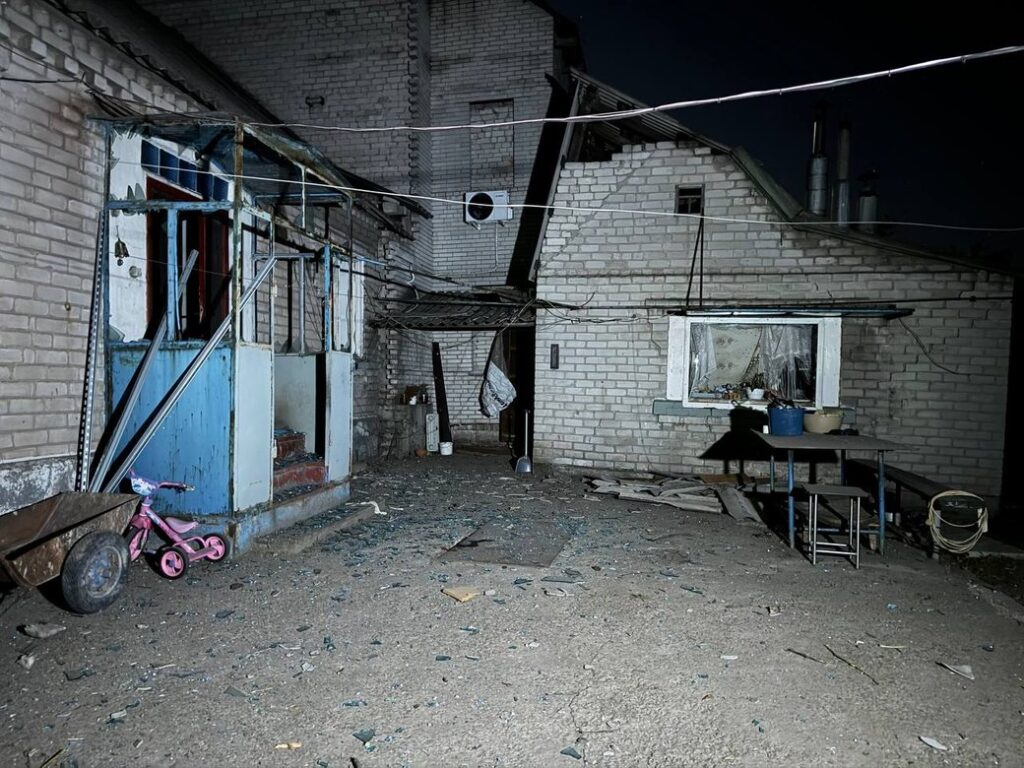
The blast wave threw his wife from their home. Viktor found her unconscious under the door and dragged her to safety before their children rushed her to the hospital. Windows and doors throughout his house were blown out, his barn burned down, and a massive crater now marks his garden.
“The blast wave threw her out of the house. I found her under the door and dragged her to the garage, and the children took her to the hospital,” he shared.
Ivan Fedorov, head of the Zaporizhzhia Regional Military Administration, reported that four people required hospitalization: three women and one man injured, all in moderate condition. But the kindergarten bore the worst damage—80% of the building destroyed.
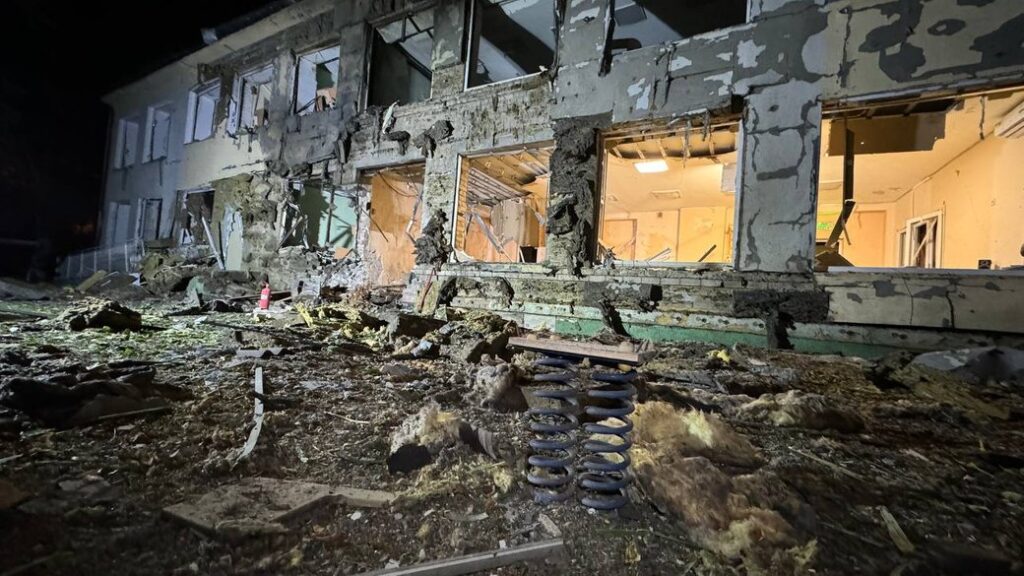
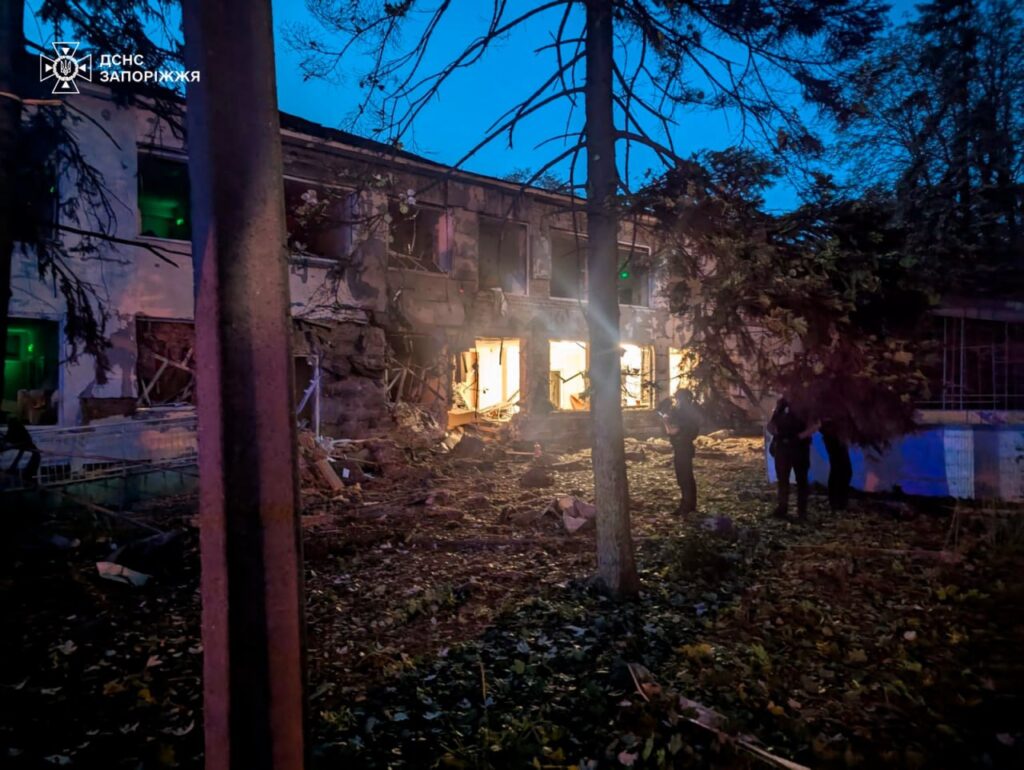
Ukrainian air defenses managed to intercept some drones before they reached their targets. The ones that got through also damaged six apartment buildings, four private houses, and critical infrastructure.
The Zaporizhzhia Regional Prosecutor’s Office opened a criminal investigation, confirming the weapons as Shahed-type strike drones—the same Iranian-designed aircraft Russia has used in hundreds of attacks across Ukraine.
Earlier on 5 September, Russian forces killed a 56-year-old woman with an FPV drone in the same region. Over the past 24 hours, Russian forces launched 476 strikes across 15 settlements in Zaporizhzhia Oblast, damaging homes and farm buildings.
Emergency services are preparing repair work including window boarding and roof restoration once the air raid alert is lifted.
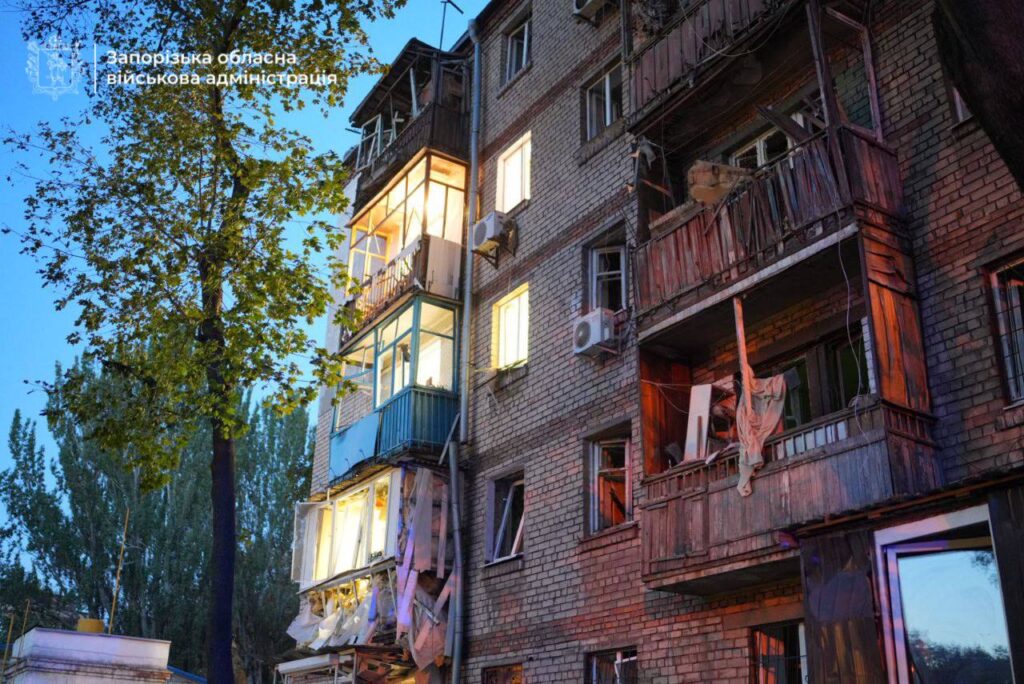
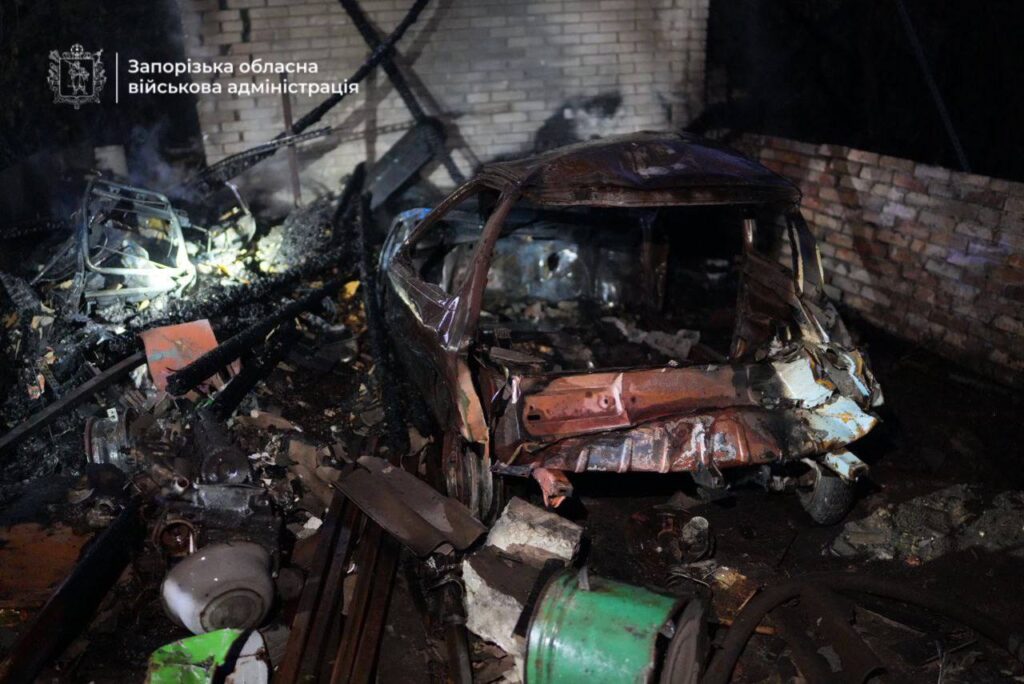
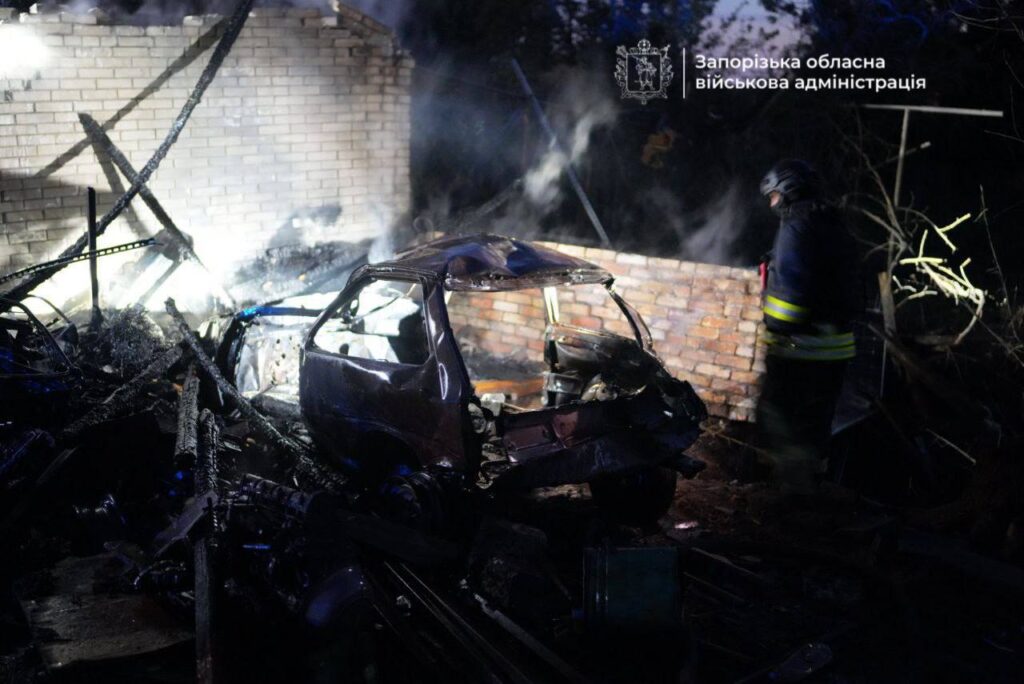
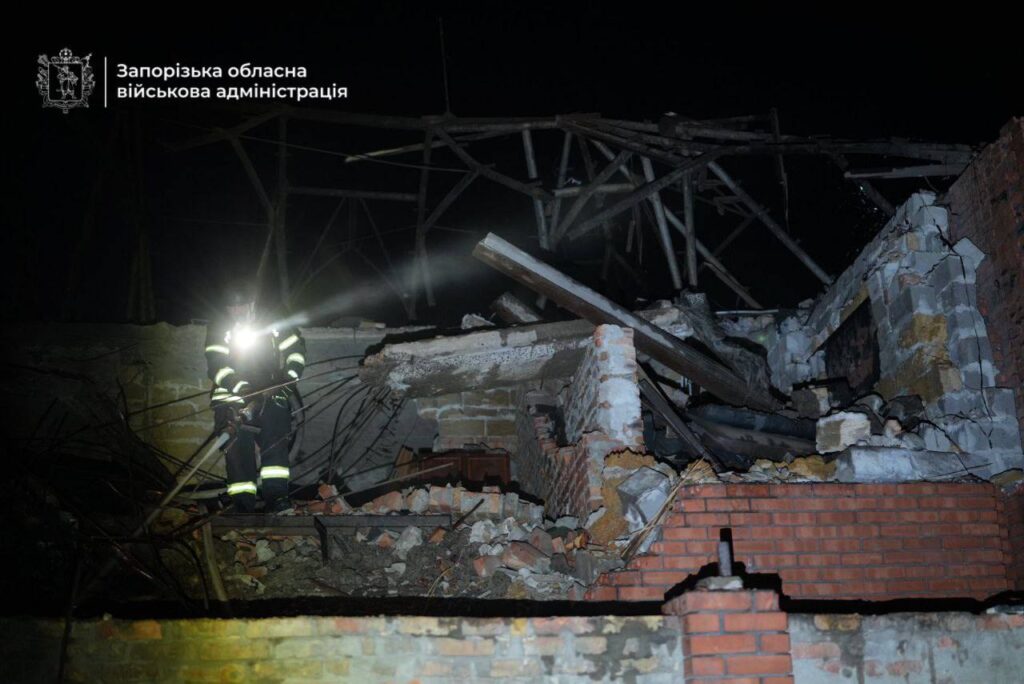
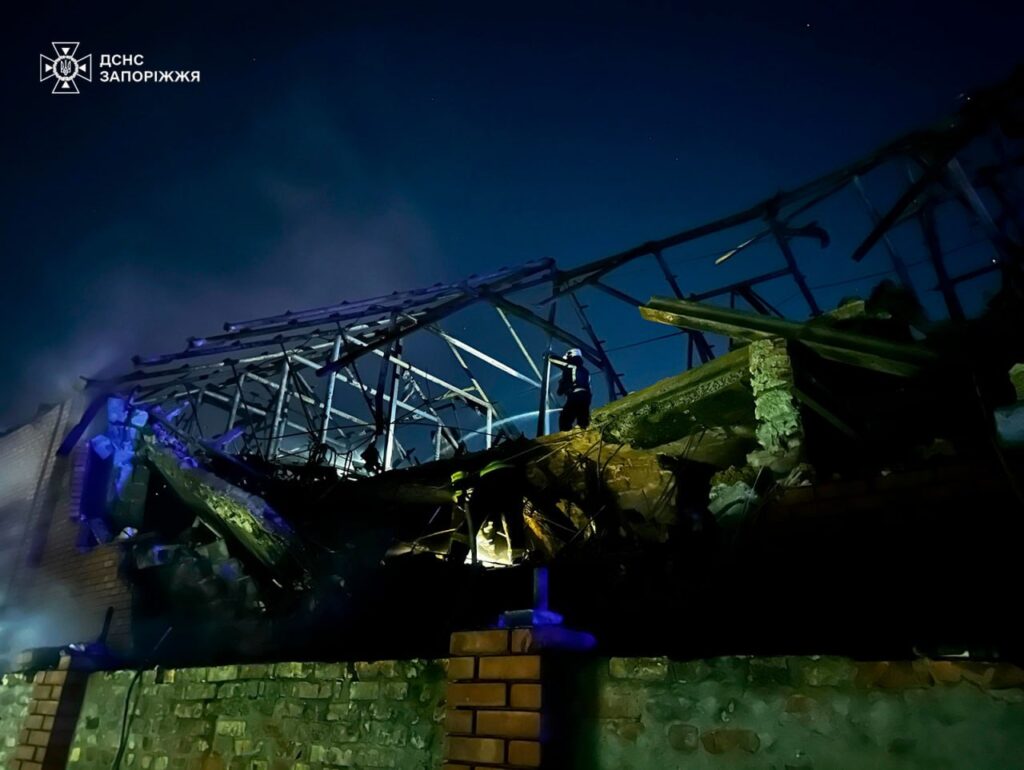


© Haiyun Jiang/The New York Times


© Jamie Kelter Davis for The New York Times
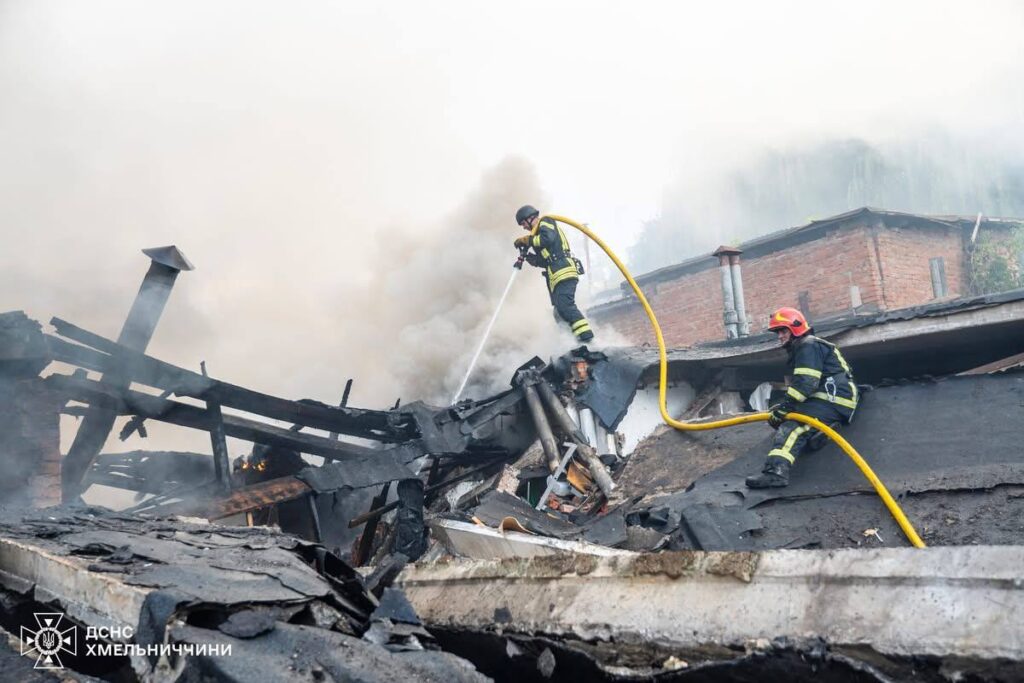

Russian forces conducted a large-scale assault on Ukraine during the night of 3 September, deploying 526 missiles and drones across multiple regions and injuring at least four railway workers.
The coordinated attack targeted several Ukrainian oblasts with cruise missiles and attack drones, causing fires, infrastructure damage, and disrupting civilian life.
Ukrainian air defense forces successfully intercepted the majority of incoming targets, though some missiles and drones struck locations across the country while debris from downed targets caused additional damage.
Ukraine’s Air Forces reported that Russian forces used X-101 and Kalibr cruise missiles along with Shahed-type attack drones and various decoy drones in the assault. According to the military statement, Ukrainian air defense systems neutralized 451 out of 526 Russian targets.
The interception breakdown included:
The military confirmed that three missiles and 69 attack drones hit 14 locations, while debris from downed targets fell across 14 additional sites.
Air raid sirens wailed across Kyiv Oblast for nearly thirteen hours, the longest alert in Vyshhorod district since the full-scale war began. Residents spent the night in subway stations and basement shelters while air defense batteries engaged incoming threats overhead.
Debris from a successful intercept crashed between apartment buildings in Vyshhorod, igniting fires that emergency crews quickly contained. The falling wreckage shattered windows in 28 apartments and destroyed two vehicles. A kindergarten lost its windows to the blast wave.
Regional governor Mykola Kalashnyk reported no casualties despite the extensive property damage.
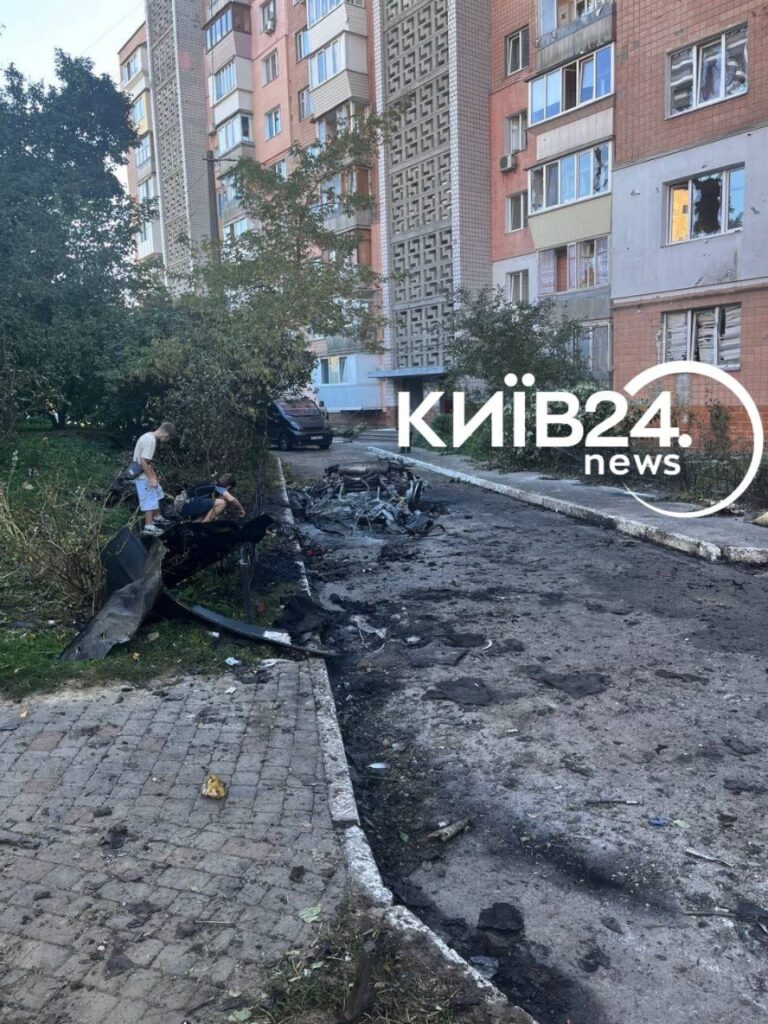
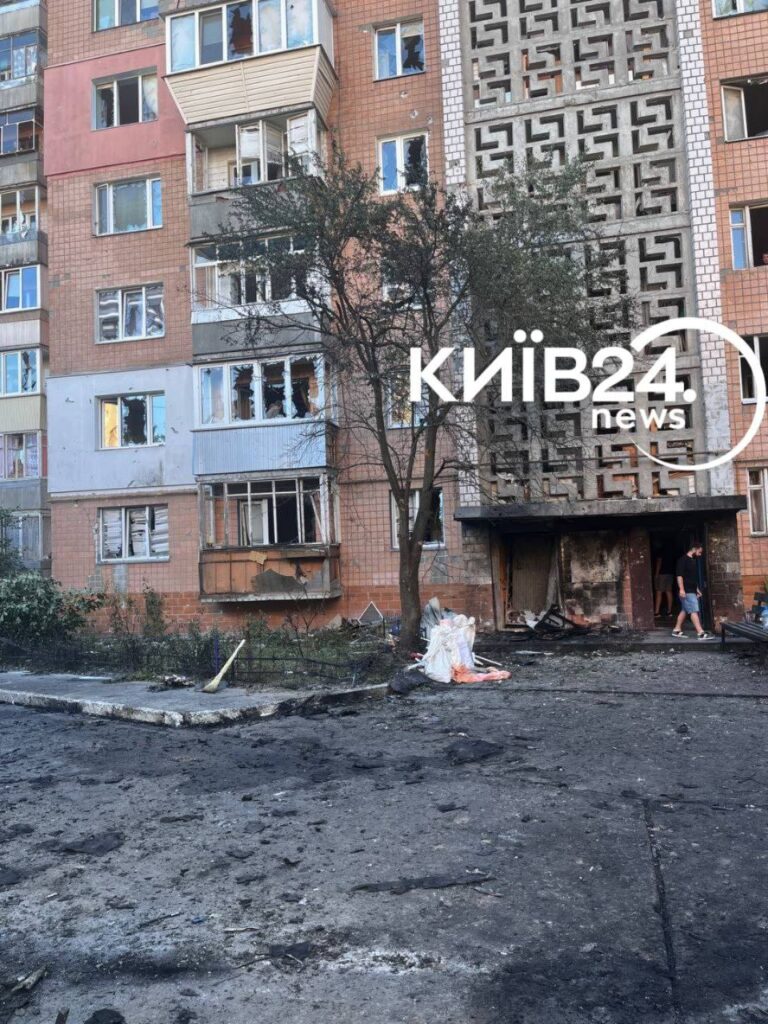
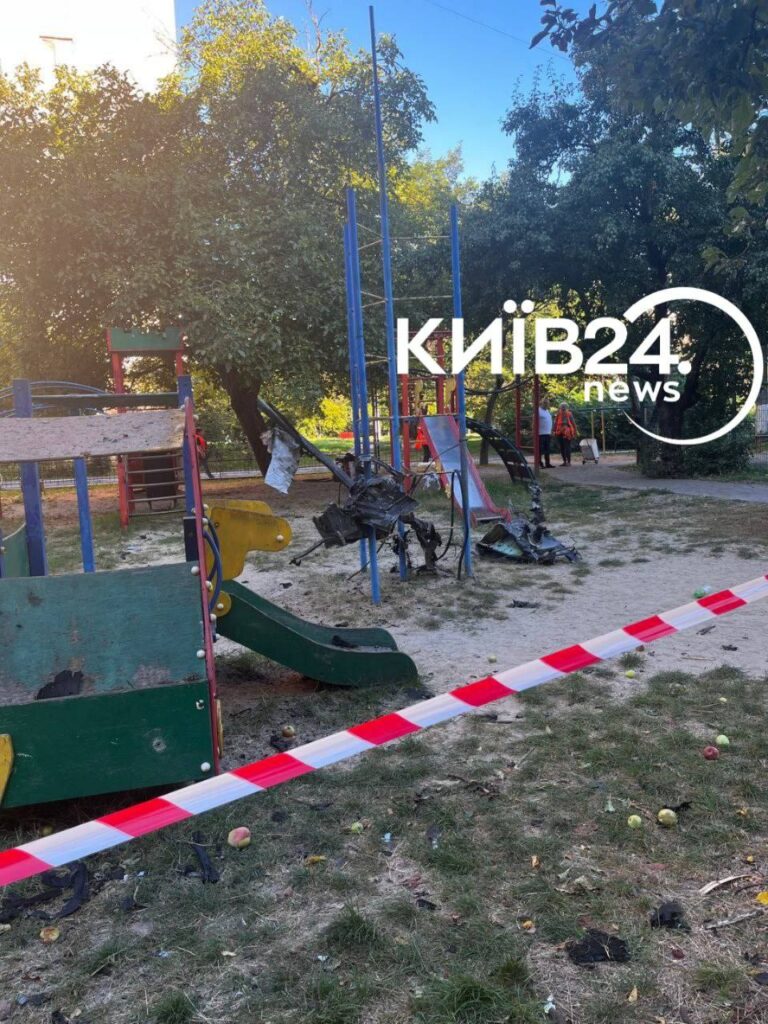
The attack on Znamianka in central Kirovohrad Oblast specifically targeted railway infrastructure, resulting in injuries to four railway workers, according to Ukrzaliznytsia, Ukraine’s national railway company. The attack disrupted freight and passenger services along key supply routes.
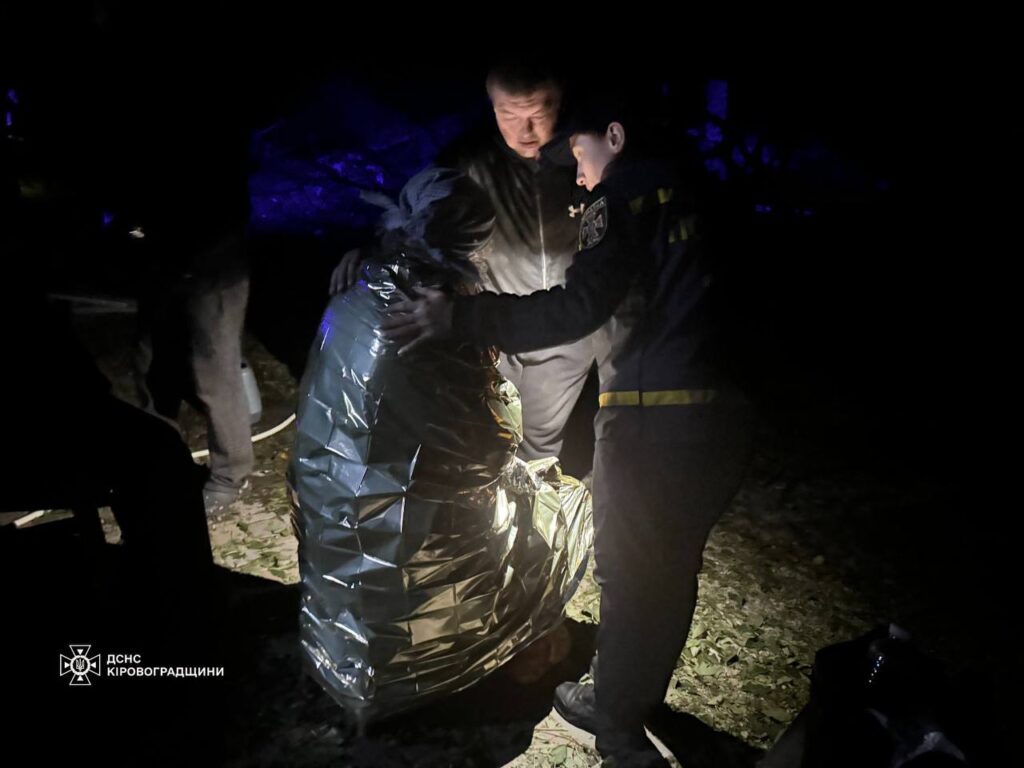
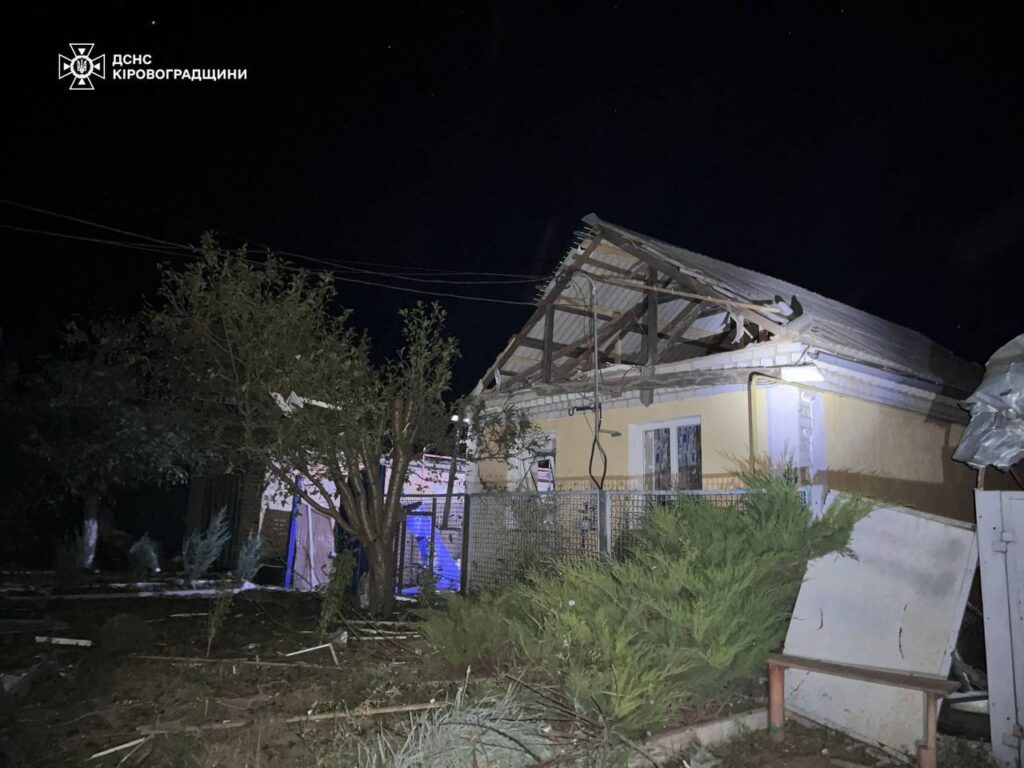
In the western city of Lutsk, drone attacks caused fires in two garages and one outbuilding, while debris damaged another outbuilding and completely destroyed a private freight vehicle, according to mayor Ihor Polishchuk. The attacks reached deep into what many residents considered relatively safe territory.
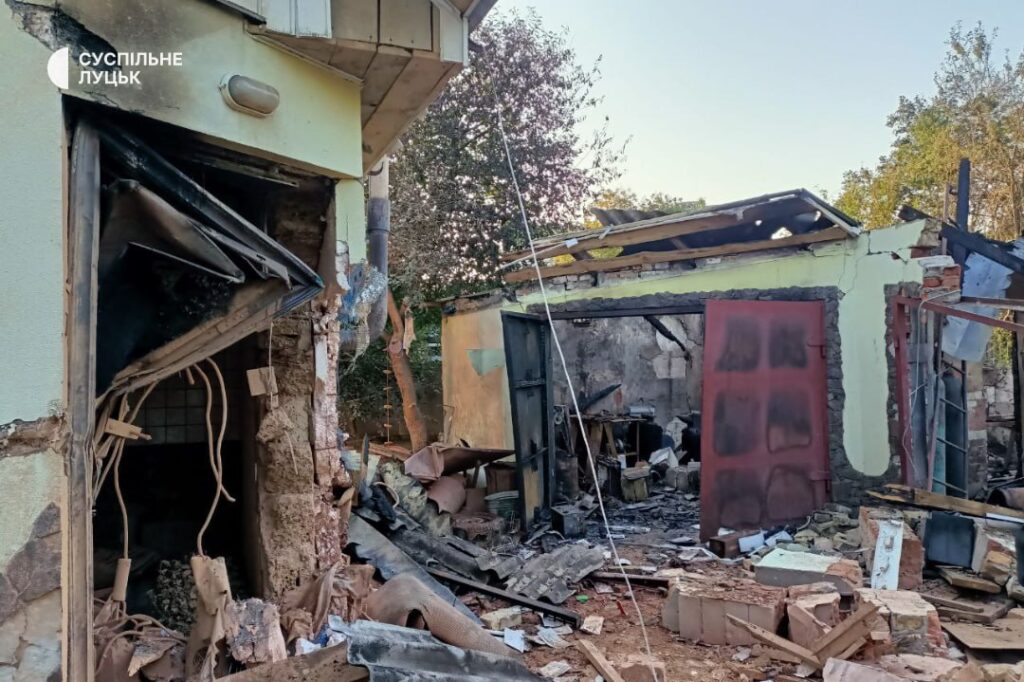
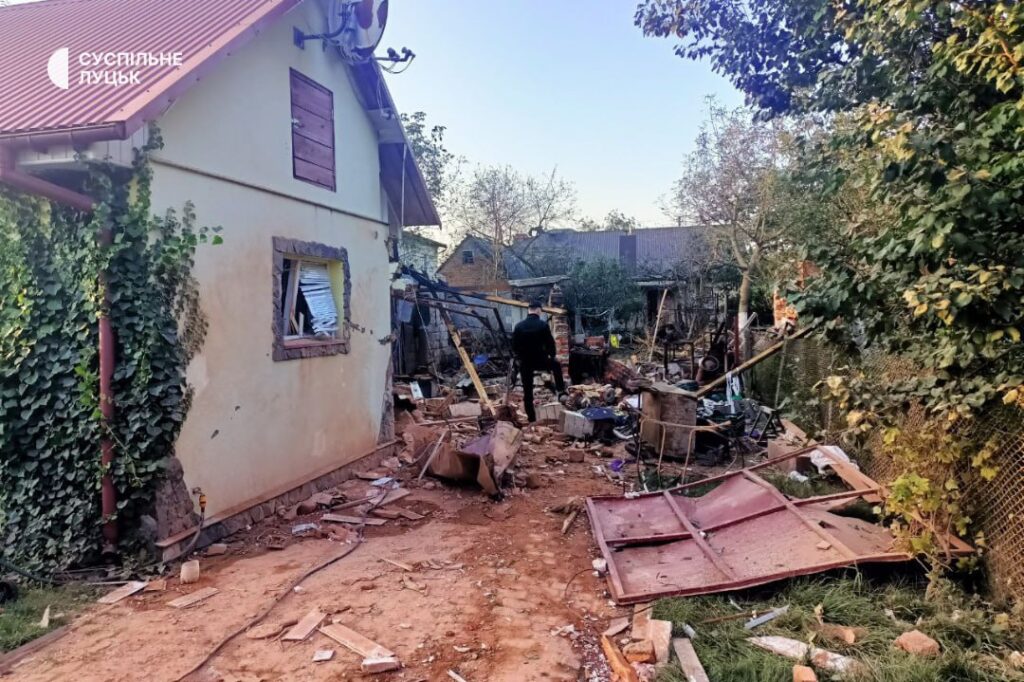
The city of Khmelnytskyi sustained damage and fires that disrupted public transportation services, with mayor Oleksandr Symchyshyn reporting window damage to residential buildings.
The regional administration reported that Russian forces conducted two separate attacks using missiles and drones, resulting in fires at a garage complex where 10 garages were destroyed and five others caught fire.
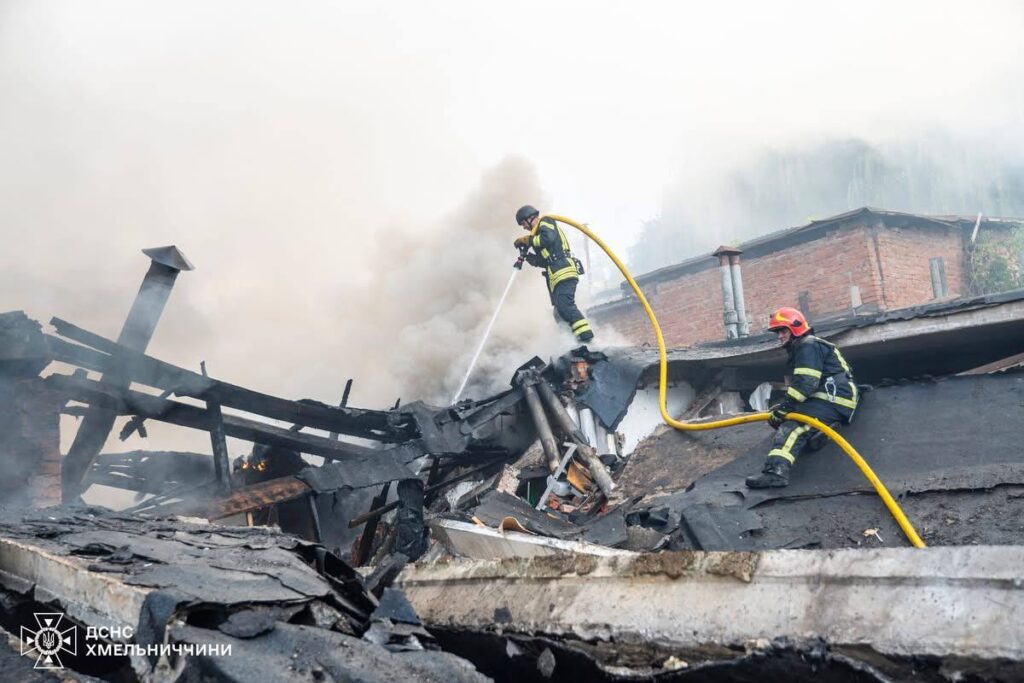
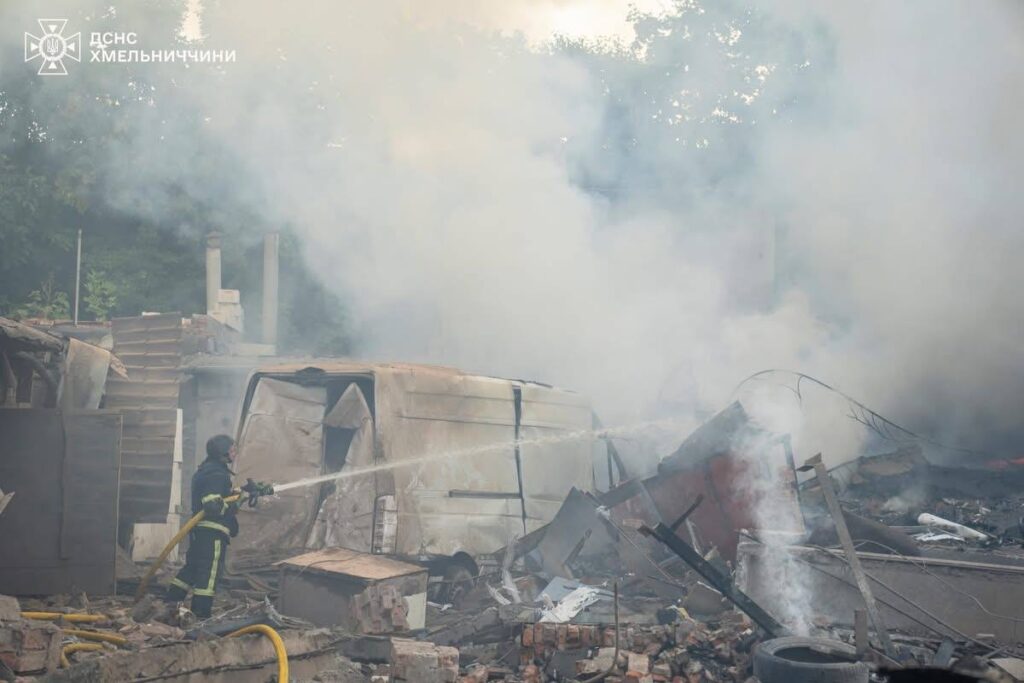
According to the State Emergency Service, western Ivano-Frankivsk Oblast experienced warehouse fires at three locations in Kalush district, requiring 130 emergency workers and 35 units of emergency equipment for response operations.
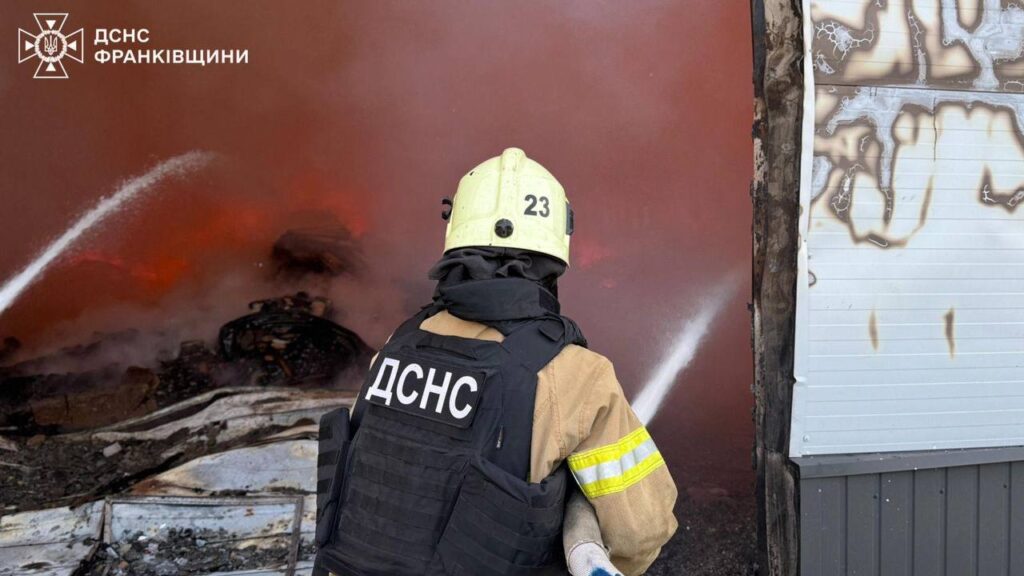
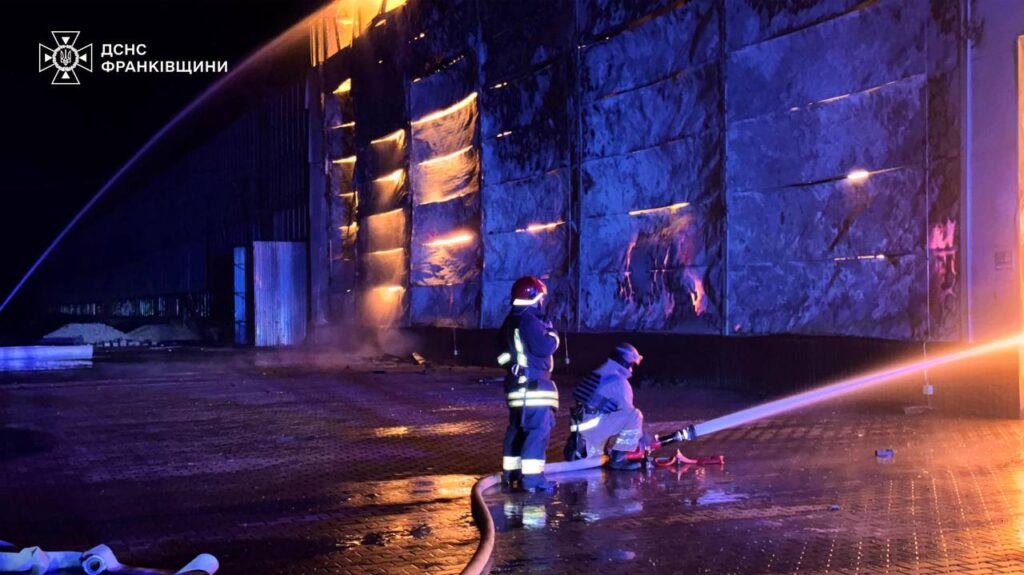


© Eduardo Munoz/Reuters
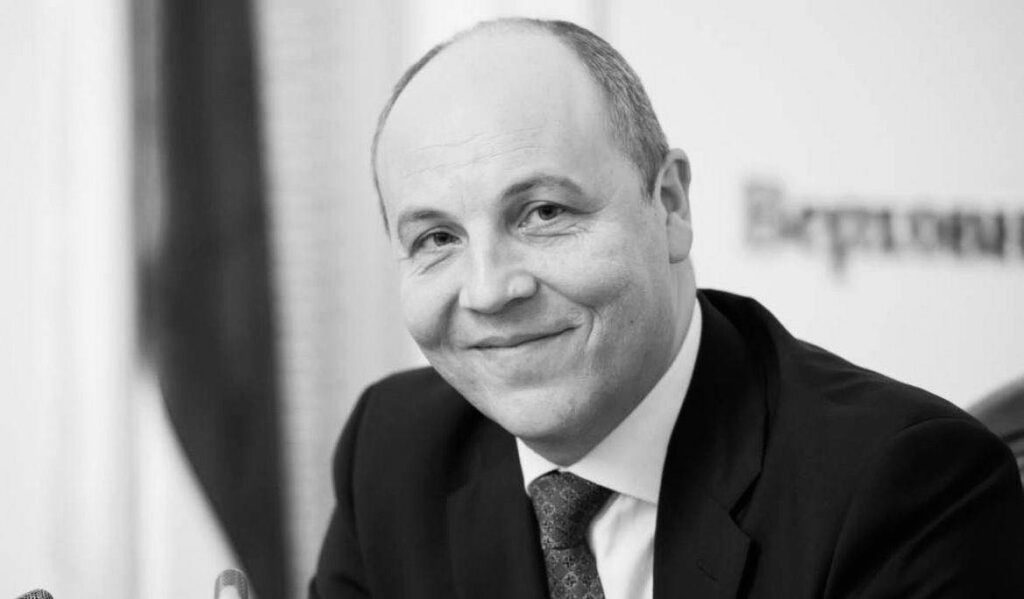

Ukrainian authorities captured a suspect in the killing of former parliament speaker Andriy Parubiy following a 36-hour manhunt that President Volodymyr Zelenskyy personally authorized. Investigators say they’re focusing on a potential Russian connection to what appears to be a meticulously planned assassination.
On 30 August, in broad daylight on a Lviv street, a man dressed as a delivery courier approached Parubiy. The gunman fired eight shots at the lawmaker before confirming his death and fleeing the scene. Video footage captured the execution, showing the killer’s deliberate courier disguise before he vanished.
But 36 hours later, police found him hiding in the Khmelnytsky Oblast of western Ukraine. The 52-year-old suspect from Lviv now faces premeditated murder and illegal weapons handling charges carrying up to 15 years in prison.
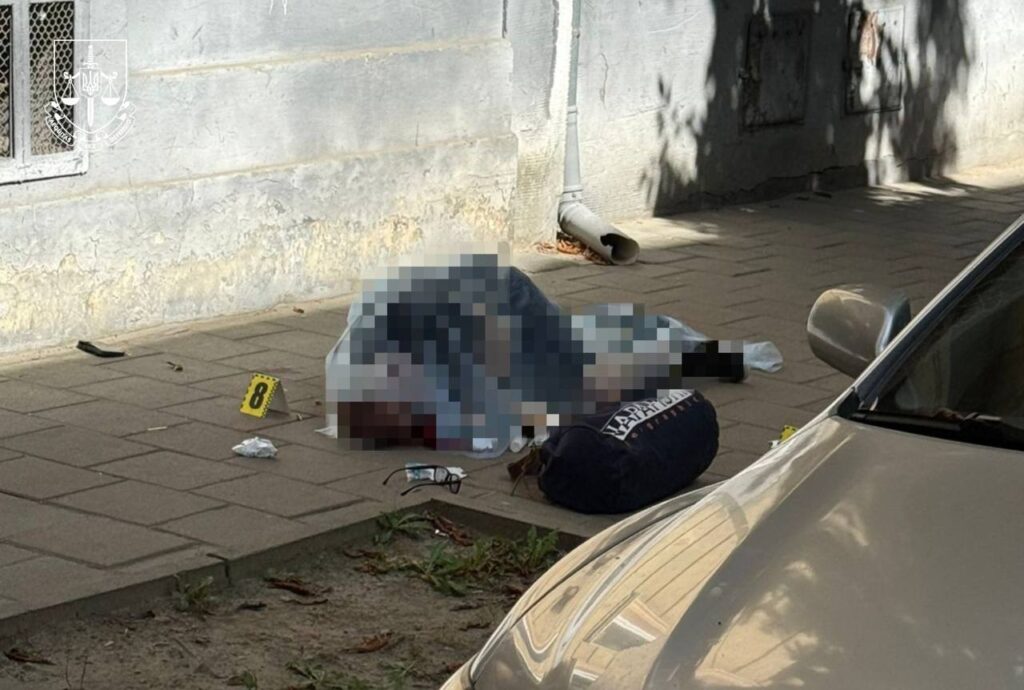
“The crime was carefully planned, its preparation lasted more than one month,” senior investigator Andriy Nebitov told reporters. The perpetrator had studied Parubiy’s daily routines, mapped multiple escape routes, and prepared detailed contingency plans.

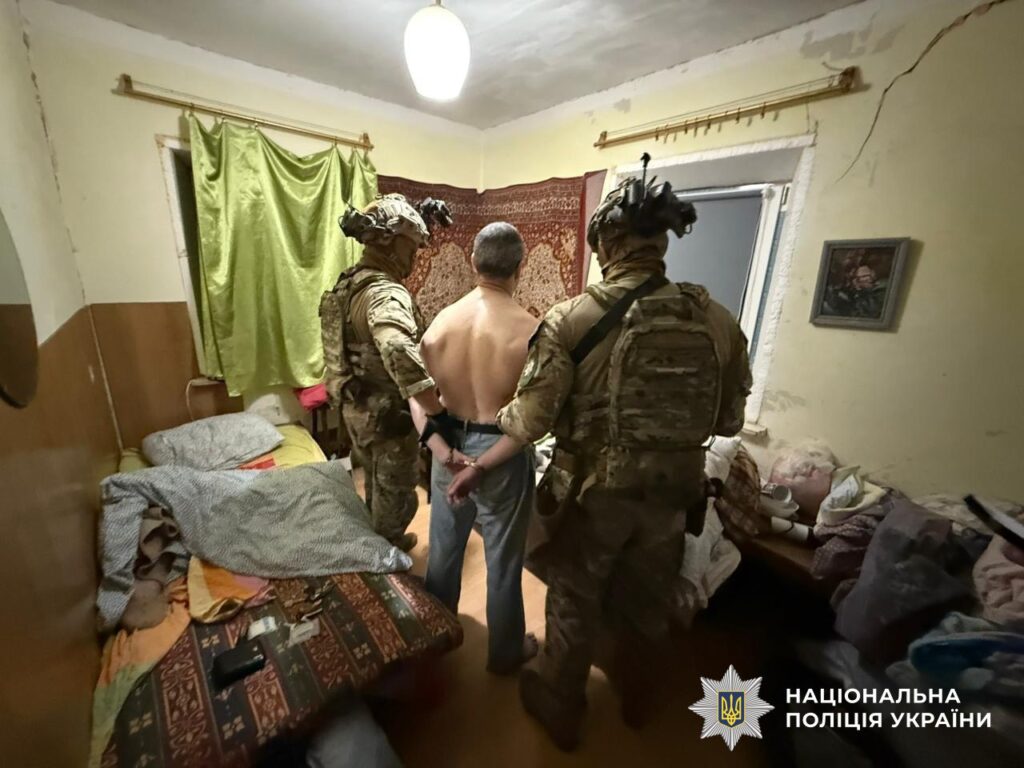
After the shooting, the suspect tried to cover his tracks. He changed clothes, ditched the weapon, and fled toward western Ukraine’s rural areas. Law enforcement found objective evidence linking him to the killing, according to prosecutors who are preparing to hold him without bail.
“Today we prioritize considering the Russian trace — an order from the Russian Federation,” Nebitov added without providing specifics.
Ukraine’s Security Service also says the assassination bears hallmarks of a contract killing with Russian involvement.
“The crime has signs of being ordered,” said Vadim Onyshchenko, head of the SBU’s Lviv Oblast department. “There is operational information that indicates possible involvement of Russian Federation special services in organizing the murder.”
“Revenge on Ukrainian authorities,” he told the reporters, according to a Hromadske correspondent in the courtroom.
The suspect also stated he expects a quick sentence so he can be exchanged for prisoners of war, saying he wants to find his son’s body.
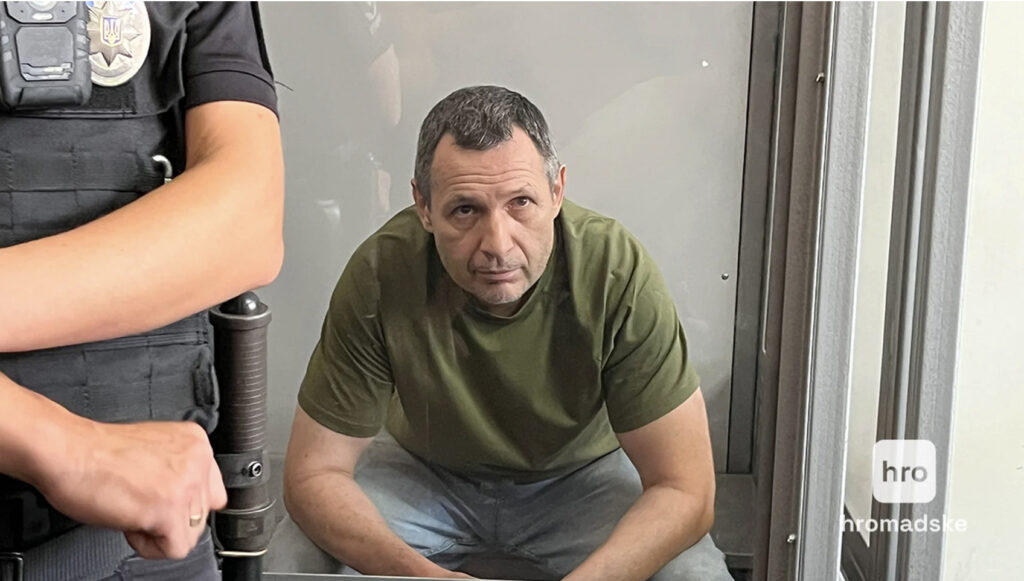
Earlier, Lviv’s Vysokyi Zamok newspaper cited unnamed sources who claimed the suspect’s son went missing a year ago, apparently on the front line. According to these reports, Russians allegedly told him they would return his son’s body in exchange for killing any prominent Ukrainian politician. This information is not yet verified.
However, if true, this would represent a different kind of Russian operation—not a professional hit against the anti-Russian politician, but exploitation of a desperate father’s grief.
Parubiy, 52, was a defining figure in Ukraine’s modern political development and maintained a consistently anti-Russian stance throughout his career.
He co-founded the Social-National Party of Ukraine in 1991, when Ukraine gained independence from the Soviet Union, which declared in its early program that it “considers the Russian state the cause of all troubles in Ukraine.”
The statement seemed extreme at the time—so controversial that Ukraine’s Ministry of Justice delayed registering the party until 1995. But Parubiy’s early anti-Russian stance proved accurate, with Ukraine fighting Russian aggression since 2014 and facing full-scale invasion since 2022.
The politician played pivotal roles in Ukraine’s two major democratic upheavals. During the 2004 Orange Revolution, he served as commandant of the Ukrainian House, a key protest site.
The mass protests in 2004 erupted after a rigged presidential election tried to install Moscow-backed Viktor Yanukovych over pro-Western Viktor Yushchenko. Hundreds of thousands of Ukrainians took to the streets for weeks until authorities agreed to a revote that Yushchenko won.
Nearly a decade later, Parubiy became the de facto leader of the Euromaidan demonstrations in 2013 and 2014, aimed at fighting for Ukraine’s future int he EU and away from Russian influence,
“From that megaphone I started the rally,” Parubiy once recalled about launching the initial Euromaidan protest. “In the first minutes there were 70-80 of us, there were more police around us than us.”

From those chaotic first hours, Parubiy built a protest movement that lasted three months. He organized the tent city, established defensive barricades, and created what became known as “Maidan Self-Defense”—a structured force that grew to 12,000 people by February 2014. He appointed “centurions” to command different sectors and coordinate security for the sprawling protest camp.
Unlike other opposition politicians who negotiated with Yanukovych’s government, Parubiy stayed focused on organizing the grassroots protesters. When government snipers eventually opened fire on demonstrators, killing over 100 people, Parubiy claimed Russian operatives were involved in the shootings both targeting protesters and government forces to maximize chaos.
Following the revolution, Parubiy was appointed Secretary of the National Security and Defense Council, where he helped establish Ukraine’s National Guard by incorporating Maidan self-defense forces. He oversaw anti-terrorist operations against separatists in eastern Ukraine and was a vocal opponent of the Minsk peace agreements.
“I believed and believe that the agreements were signed under very unfavorable conditions for Ukraine,” he said, arguing that Russian President Vladimir Putin had no intention of implementing them and could only be stopped by force.
Parubiy served as speaker of Ukraine’s parliament from 2016 to 2019, working alongside politicians including former president Petro Poroshenko and opposing what he called Russian attacks on Ukrainian language and culture. After stepping down as speaker, he continued serving as a member of parliament representing the European Solidarity party.
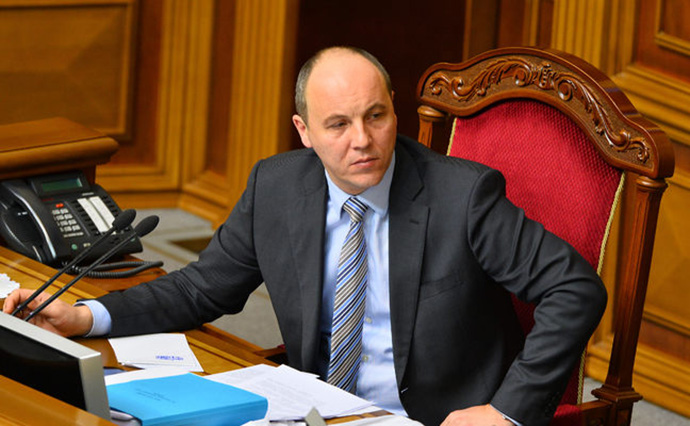
His most dramatic parliamentary moment came in 2010, when he smuggled a smoke grenade into the chamber to disrupt ratification of the Kharkiv Accords—agreements that extended Russia’s lease of its Sevastopol naval base in Crimea and allowed expanded Russian military presence on the peninsula. The stunt failed, but Parubiy’s fears proved justified when Russia seized Crimea in 2014 and launched a war in eastern Ukraine that continues today.
“If we hadn’t allowed this then, far fewer Russian troops would be stationed in Crimea, everything could have gone differently,” he later reflected.
When Russia launched its full-scale invasion in 2022, Parubiy joined territorial defense forces and served at checkpoints around Kyiv. He consistently advocated for the complete destruction of what he termed the “Russian empire.”
“This is today a chance for the Ukrainian army and people to destroy this empire,” he declared, arguing that Russia would remain a perpetual threat if not decisively defeated.
“If it [Russian empire] doesn’t die today, it will continue to remain a threat to us, to our children. And we must leave our children a peaceful sky and end this war with the complete defeat of the Russian army,” he added.
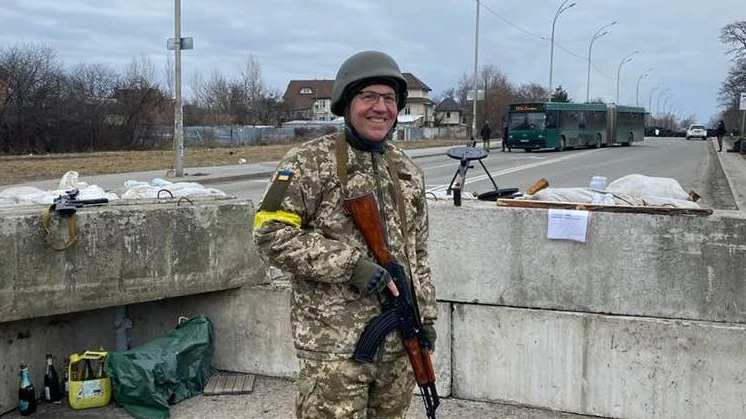
His European Solidarity party colleagues have demanded a thorough investigation, stating they believe the murder is connected to his pro-Ukrainian positions. The party suggested Russia and its supporters were behind the killing, noting that “Moscow sincerely hated Parubiy as one of the state-builders of modern Ukraine.”
The investigation continues as authorities examine all possible motives while focusing on the Russian connection. President Zelenskyy announced that the suspect has already provided initial testimony to investigators.


© Liam James Doyle for The New York Times
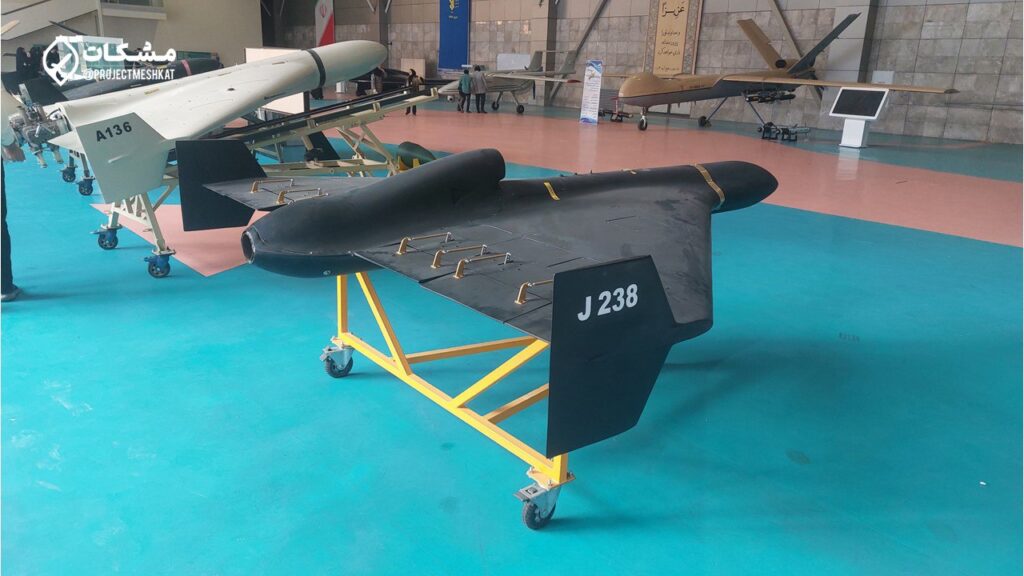

Russian forces deployed rocket-propelled Shahed drones during the overnight attack on Kyiv on 28 August, according to Yurii Ihnat, head of the Communications Department of the Ukrainian Air Force Command.
These modified drones exhibit flight parameters resembling cruise missiles, Ihnat told Hromadske.
The Ukrainian Air Force first documented these jet-powered strike drones during summer operations. Ihnat explained that while cruise missiles typically reach speeds of 700 km/h, the rocket-propelled Shaheds operate at 300-500 km/h.
“They are difficult to shoot down,” the military official added.
Russia has not yet deployed these modified drones en masse, according to Ihnat.
“Previous times we recorded eight units. This time there were also some, but not many,” Ihnat said, declining to specify the exact number of rocket-powered drones launched against Kyiv during the 28 August attack.
During the latest attack on Kyiv, Russian forces employed various weapons and different drone types. Beyond conventional and rocket-propelled Shaheds, Russia deployed decoy drones, which they have also begun equipping with explosive warheads.
Russian forces launched 31 missiles and 598 drones against Ukraine during the overnight attack on 28 August. Current casualty reports indicate 18 dead and nearly 40 injured from the nighttime bombardment, including children.
The Russian strikes damaged the European Union representation building in Ukraine and the British Council office in Kyiv. Foreign Minister Andrii Sybiha declared the diplomatic facility attacks constitute direct violations of the Vienna Convention, emphasizing such strikes require condemnation from the EU and the international community.
Additional damage occurred to the offices of Ukrainska Pravda and Radio Svoboda media outlets, a Nova Poshta sorting depot where three people were injured, Ukrzaliznytsia’s high-speed train park, and other facilities. The Ukrainian Air Force reported that Russian forces targeted a residential building in Kyiv with two missiles, destroying the structure.


© Saher Alghorra for The New York Times


© Saumya Khandelwal for The New York Times


A 23-year-old Ukrainian woman who recently fled to the United States to escape the war in her homeland was fatally stabbed on 22 August night at a Charlotte light rail station.
Iryna Zarutska was found dead at 9:55 p.m. at the South End light rail station in Charlotte, North Carolina.

Police arrested 34-year-old Decarlos Brown Jr. at the scene and charged him with first-degree murder. Brown was hospitalized with non-life-threatening injuries sustained during the incident.
Court records show Brown has been arrested multiple times since 2011 on charges including felony larceny, robbery with a dangerous weapon, and communicating threats. Most of these charges were subsequently dropped, according to The Charlotte Observer.
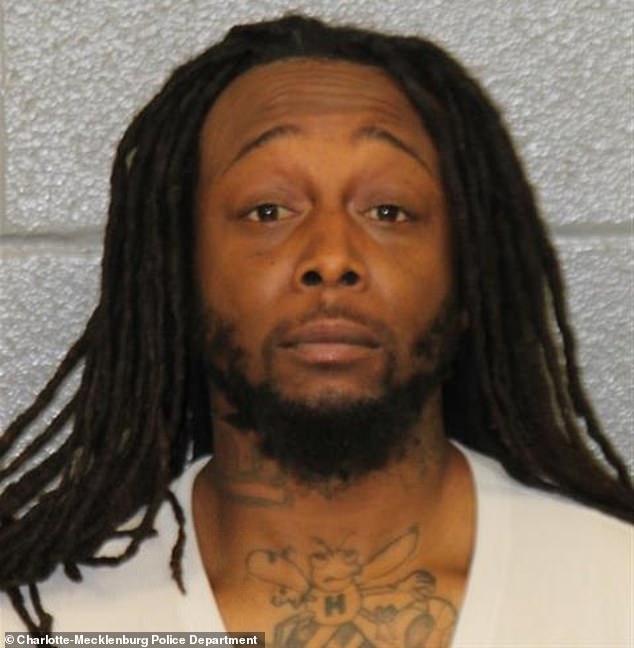
The pattern continued this year. In January, Brown called 911 after a welfare check, telling officers he believed someone had placed a “man-made” material inside his body that controlled when he ate, walked, and talked. When officers explained this was a medical issue beyond their scope, Brown became upset and called 911 again. He was arrested after hanging up.
His public defender has now filed a motion questioning his capacity to proceed with the murder case. Brown is reportedly homeless.
The killing has shaken confidence in Charlotte’s transit system. Council member Edwin Peacock put it bluntly: “The trust and confidence that we have right now, and particularly between South End and Uptown, it’s very fragile right now.”

Peacock knows what comes next. “I know from my experience of living in Washington, D.C., and having lots of friends in Atlanta that the moment where the transit system starts to become something where it’s not considered to be safe is the moment in which you begin to lose riders, to lose momentum.”
Police have not disclosed what led to the stabbing. The investigation remains active and ongoing, with authorities asking anyone with information to contact the Charlotte-Mecklenburg Police Department.
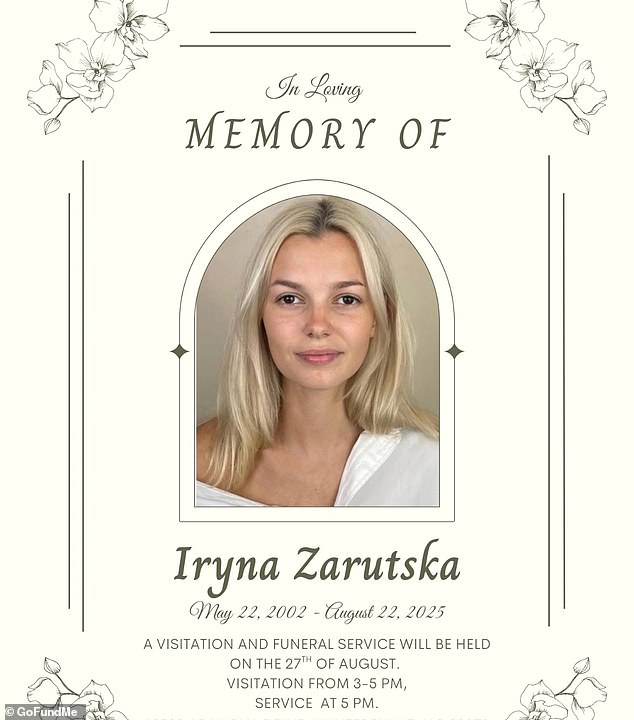
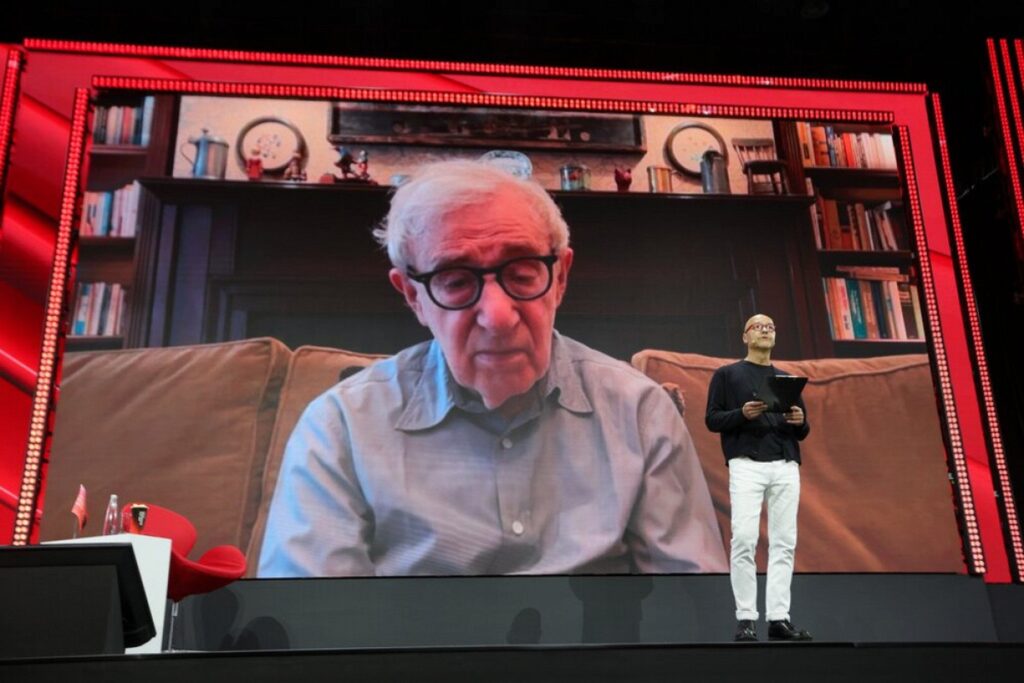

American director Woody Allen joined Russia’s premier film festival via video link this weekend, appearing at the Moscow International Cinema Week as Russian forces continue killing Ukrainian civilians and cultural figures in the ongoing war.
Ukraine’s Foreign Ministry delivered a sharp rebuke in response, calling Allen’s participation “whitewashing Russian crimes” and an insult to Ukrainian filmmakers killed or injured in the conflict.
“By taking part in a festival that brings together Putin’s supporters and voices, Allen chooses to turn a blind eye to the atrocities Russia commits in Ukraine every single day for 11 years now,” their statement reads.
The ministry then declared: “Culture should never be used to whitewash crimes or serve as a propaganda tool.”
Allen joined Saturday’s “World Cinema Legends” session, where Russian director Fedor Bondarchuk conducted the interview, according to Russian news agency Afisha Daily.
The conversation revealed Allen’s longstanding connection to Russian culture. He told the audience he had watched the nearly seven-hour Russian film “War and Peace” in a single day and recalled meeting Sergei Bondarchuk, Fedor’s father and the renowned Soviet director, in New York years earlier.
Allen also detailed his three previous visits to Russia. His first trip during Soviet times left him with a “gloomy” impression, but later visits proved more positive.
“We came to St. Petersburg. Went to the ballet, walked through museums, I liked everything. From there we moved to Moscow,” he said.
The conversation took an uncomfortable turn when Bondarchuk asked about potential film projects in Russia. Allen dismissed previous rumors but left the door open:
“If such offers existed, I would sit down and think about what the script could be about how good you feel in Moscow and St. Petersburg.”
The festival also featured other international participants, including Serbian director Emir Kusturica, who has publicly supported Putin’s policies and the military action in Ukraine, and American actor Mark Dacascos, known for roles in “John Wick 3” and “Brotherhood of the Wolf.”
88-year-old Allen, whose career spans over 50 films, has won four Academy Awards from 16 nominations. The director has faced industry scrutiny in recent years following allegations from his adopted daughter Dylan Farrow, who accused him of abuse in 1992.
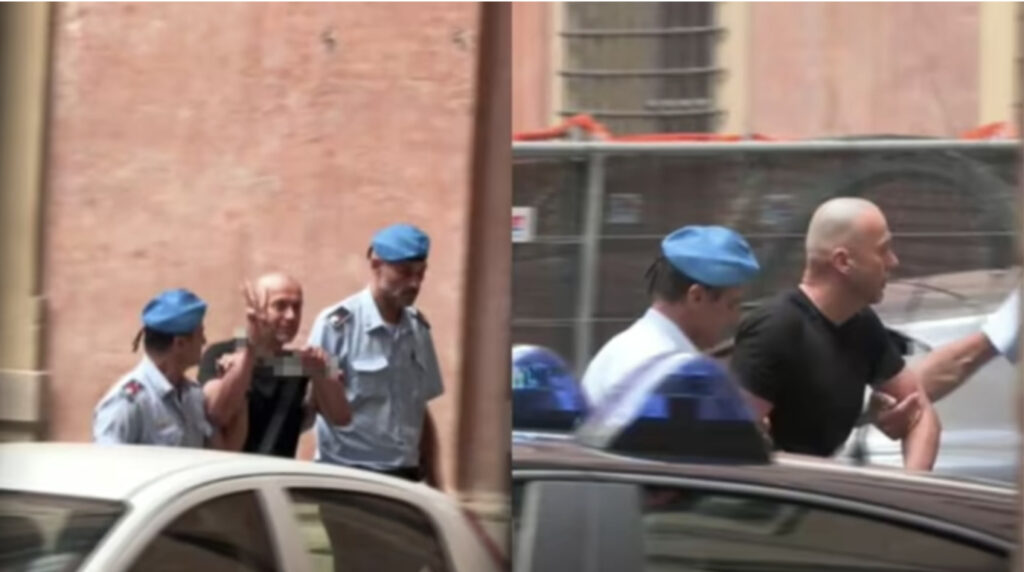

New details have emerged about the technical execution of the September 2022 Nord Stream pipeline attacks, with German investigators revealing that at least four explosive devices weighing 14 to 27 kilograms each were used to destroy the pipelines at depths of 70-80 meters in the Baltic Sea.
The explosive devices consisted of a mixture of RDX and HMX and were equipped with delayed-action detonators, according to the arrest warrant for Ukrainian suspect Serhii Kuznetsov obtained by Tagesschau.
German investigators believe the operation involved a six-person team comprising a skipper, four divers, and an explosives expert who coordinated the placement of the bombs on both Nord Stream 1 and Nord Stream 2 pipelines.
Serhii Kuznetsov allegedly coordinated the entire mission. The 49-year-old Ukrainian—a former Security Service employee and retired Armed Forces captain—was arrested on 20 August at an Italian beach resort near Rimini where he was vacationing with his family.
When Italian police brought him to court in Bologna, handcuffed and flanked by three officers, Kuznetsov made a defiant gesture to waiting journalists. Three fingers. Ukraine’s trident symbol.
Kuznetsov boarded the rented sailing yacht “Andromeda” from Wiek on Germany’s Rügen island, coordinated the team as they planted bombs on both Nord Stream 1 and 2 pipelines, then departed on September 22. A driver picked him up and took him back to Ukraine. The remaining team members returned to Hohe Düne near Warnemünde—where they’d originally rented the boat.
How did German investigators crack the case? The investigation began in October 2022, with German Federal Criminal Police and Federal Police conducting underwater examinations using diving robots, collecting soil samples, and recovering pipeline fragments.
A breakthrough came through intelligence from a foreign service that led investigators to the “Andromeda” yacht, which had been rented in Mecklenburg-Western Pomerania using false identities through a Polish shell company. When investigators examined it, they found fingerprints, DNA traces, and explosive residue. The evidence trail started there.
Italian media report that Kuznetsov’s lawyer has rejected the charges, and the suspect has refused to consent to extradition to Germany.
This represents the first arrest in what prosecutors call one of Europe’s most spectacular acts of sabotage. But it’s not the first suspect they’ve pursued.
Last year, German authorities tried to arrest another Ukrainian, Volodymyr Z., in Poland, who was allegedly involved as a diver in the operation. Despite having a European arrest warrant, he escaped—reportedly leaving in a Ukrainian diplomatic vehicle before Polish police could detain him.
According to Wall Street Journal reporting from August 2024, the operation was planned by high-ranking Ukrainian military officials and businessmen using a recreational yacht and publicly available nautical charts. According to WSJ sources, President Zelenskyy initially approved the plan but later ordered then-Commander-in-Chief Valerii Zaluzhnyi to halt it after CIA warnings. Zaluzhnyi allegedly ignored the order.
Zelenskyy has consistently denied government involvement in the attacks. But German investigators believe they’ve identified multiple suspects—Ukrainian civilians plus current and former military personnel.
Kuznetsov faces charges of “anti-constitutional sabotage,” “intentional causing of an explosion,” and “destruction of buildings”—potentially 15 years in prison.
An Italian court will decide his fate. The key hearing is scheduled for next week.


This article was produced with support from WIRED.
The salesperson hawking Brother printers on Taobao works hard, like, really hard. At any time of the day, even when there’s no audience on the Chinese ecommerce platform, the same woman wearing a white shirt and black skirt is always livestreaming, boasting about the various features of different office printers. She has a phone in one hand and often checks it as if to read a sales script or monitor the viewer comments coming in.
“My friends, I’ve gotta plug this game-changing office tool that can double your workplace efficiency, ” the salesperson said during one recent broadcast, trying to achieve the delicate balance between friendliness and precision that has come to define the billion-dollar livestream ecommerce industry in China. Occasionally, she greeted the invisible audience. “I’m seeing a lot of friends coming into the livestream, hello this is Brother printer’s official flagship store,” she told them.
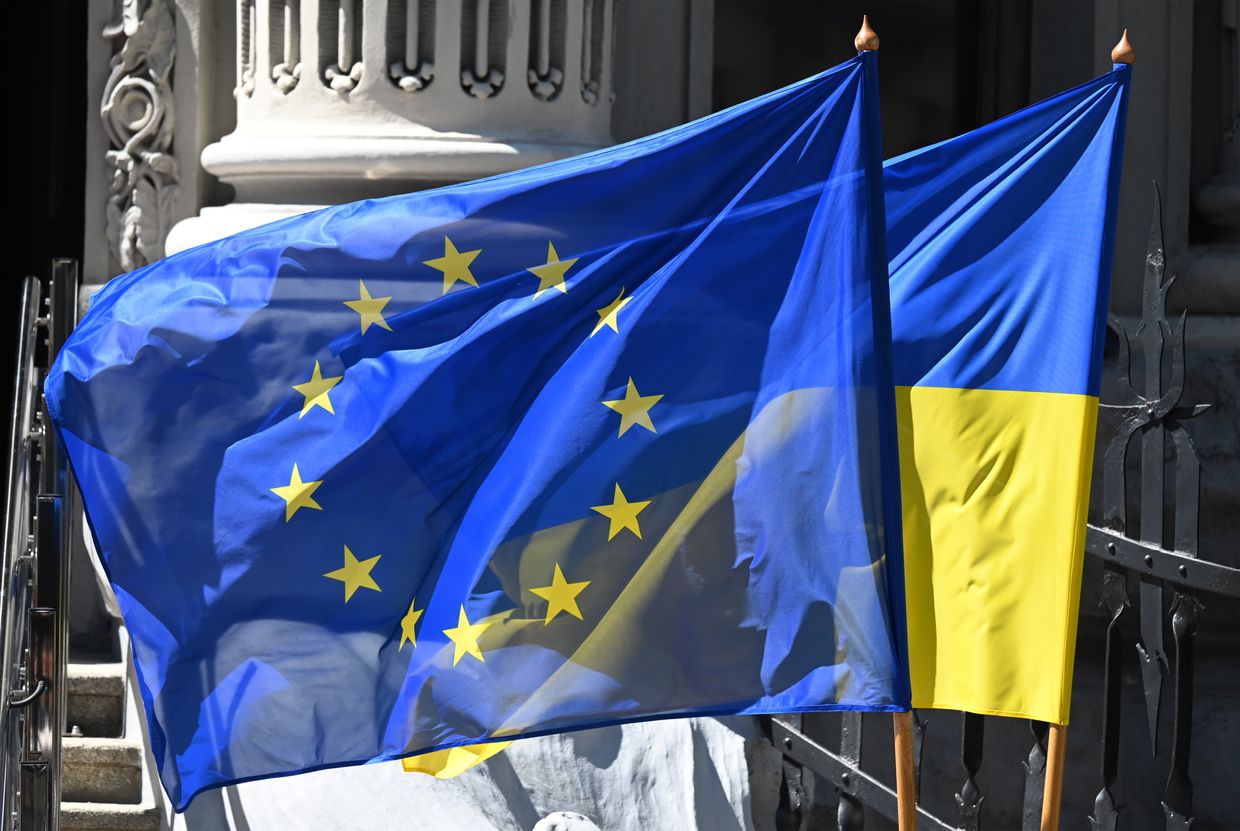

The European Union is considering establishing a fund for Ukraine worth 100 billion euros ($117 billion) in the next seven-year EU budget, Bloomberg reported on July 8, citing sources familiar with the proposal.
Sources told Bloomberg that the proposed funding, which is set to be presented later in July, would begin to be disbursed in 2028 as a means to provide additional assistance to the war-torn country amid waning U.S. support.
The proposal for an approximately 100 billion euro fund was previously touted by European Union Commissioner for Defense and Space, Andrius Kubilius, who called for the additional funding to be included in the seven-year EU budget in December 2024.
The fund, alongside other options, will be discussed before the Multiannual Financial Framework are released on July 16, according to Bloomberg.
Early in his second term as president, U.S. President Donald Trump repeatedly lambasted the EU for not providing an equal amount of support for Ukraine, urging the bloc to match spending on the war.
Since then, U.S. military and financial support have become unreliable, with contradictory statements coming out of the White House on additional military shipments in recent days.
On July 2 announced a halt in weapons shipments to Kyiv due to dwindling U.S. stockpiles, Trump later claimed he wasn't responsible for the decision and wanted to send more weapons to Ukraine.
Axios reported on July 8 that the White House is pursuing a plan to have Germany sell another Patriot battery to Ukraine, with the U.S. and European allies splitting the cost of the purchase. Sources told the outlet that Trump also pledged to send 10 Patriot interceptor missiles to Kyiv.
As support from the U.S. remains unpredictable, European countries are looking into additional ways to how it can continue to support Ukraine.
The proposed new funding agreement would follow previous support provided through the European Commission through grants and loans.
Since the start of Russia's full-scale invasion in February 2022, the EU has provided 160 billion euros ($187 billion) in aid to Ukraine. Along with Group of Seven (G7) countries, the EU has also provided loans as part of its $50 billion loan back by frozen Russian assets.
As Ukraine's budget deficit continues to grow amid the full-scale war, the European Commission is also discussing with EU member states separate options to help Kyiv sustain its economy, the Financial Times reported on July 8. The deficit could range from $8 billion to $19 billion in 2026.
 The Kyiv IndependentYana Prots
The Kyiv IndependentYana Prots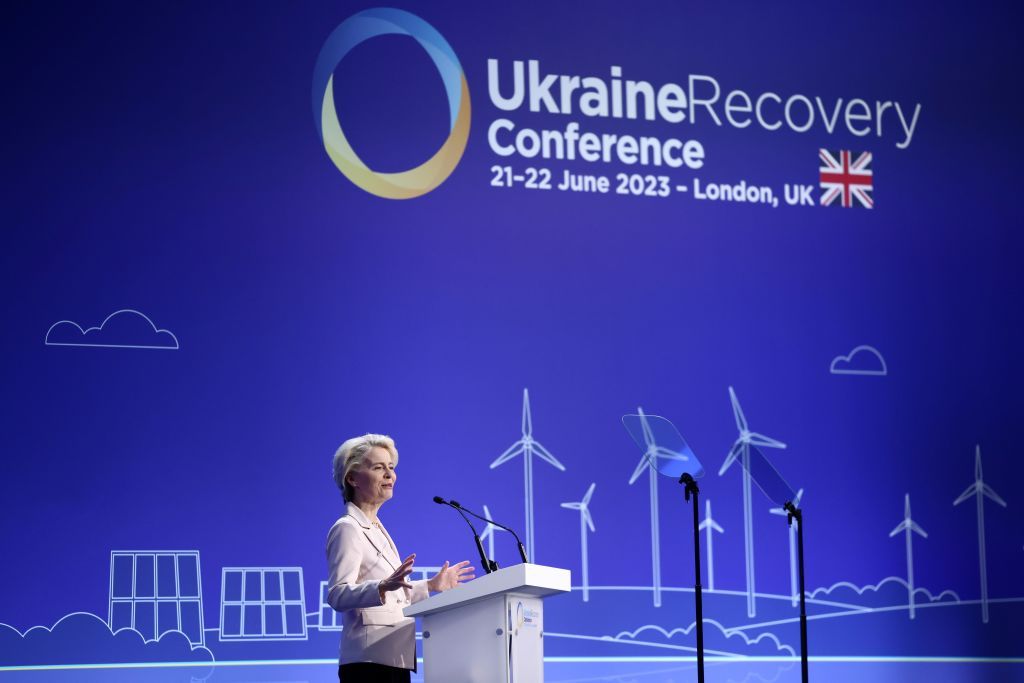
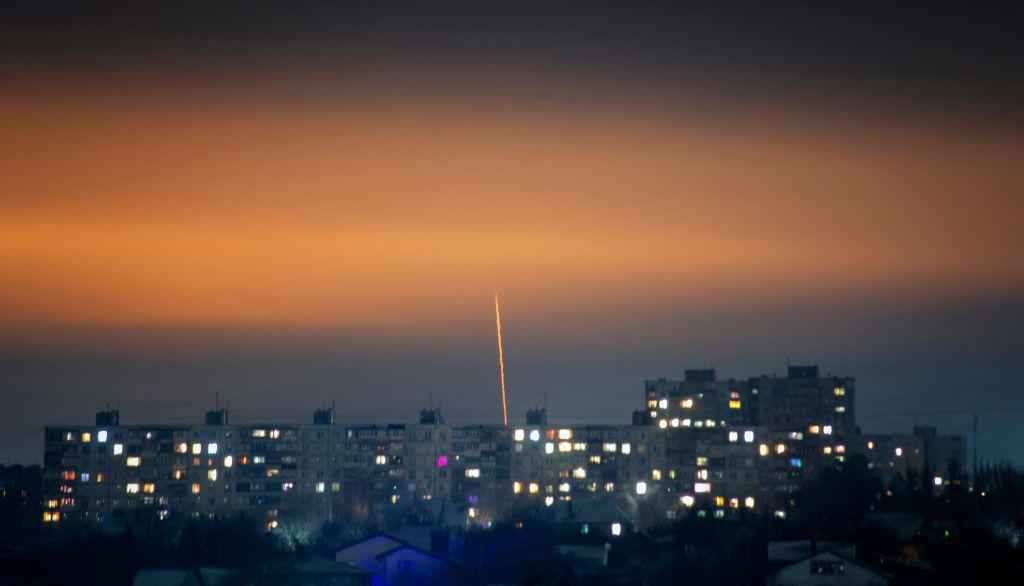

Editor's note: This is a breaking story and is being updated.
Russia launched another mass missile and drone attack overnight on July 9, targeting Ukrainian cities, including in the country's far-west regions located hundreds of kilometers from the front line.
Late spring and early summer in Ukraine have been marked by disturbingly frequent mass attacks on civilian targets, with Russia regularly terrorizing cities with ballistic and cruise missiles alongside record-breaking numbers of kamikaze drones.
Ukraine's Air Force warned late on July 8 that Russia had launched MiG-31 aircraft from the Savasleyka airfield in Nizhny Novgorod, putting the entire country under an hours-long active missile threat. Swarms of drones were also heading towards multiple cities in Ukraine, the military said.
Explosions rocked Kyiv at around midnight on July 9, according to Kyiv Independent journalists on the ground. Mayor Vitali Klitschko announced that Russian drones were attacking the city center and that air defenses were shooting down targets.
Ukraine's Air Force reported that dozens of Russian attack drones and ballistic missiles were targeting Ukraine's far-west regions, with alerts of overhead drones approaching the western cities of Lutsk, Lviv, Khmelnytskyi, and Ternopil.
Explosions were heard in the city of Lutsk in western Volyn Oblast just before 4 a.m. local time, Suspilne reported, amid warning of drones and missiles overhead. The city served as one of the hardest-hit throughout the attack.
Lutsk Mayor Ihor Polishchuk said that a fire damaged an "industrial site" as well as a garage, in what he called the "most massive enemy attack" on the city since the start of full-scale war.
The Polish Air Force said it scrambled fighter amid the attack to protect Poland's airspace. The air raid alerts were lifted in western Ukraine around 6:15 a.m. local time, after nearly seven hours of warnings from the Air Force.
At least one person was injured amid the attack, with a woman sustaining a chest fracture in city of Brovary in Kyiv Oblast, the regional military administration reported.
Explosions were also reported in communities closer to the front line, including Dnipro, Sumy, as well as over Zaporizhzhia Oblast.
Russian ballistics and kamikaze drones have targeted Kyiv and other Ukrainian cities with renewed ferocity, killing dozens of civilians and injuring hundreds more.
The renewed attacks on Ukraine comes as U.S. President Donald Trump has promised to send 10 Patriot interceptors to Ukraine, amid escalating tension between Trump and Russian President Vladimir Putin.
"It's a horrible thing, and I'm not happy with President Putin at all," Trump said. "I'm disappointed frankly that President Putin hasn't stopped (the attacks)," Trump said on July 8. The comments come after the Pentagon halted air defense weapon shipments to Ukraine.
 The Kyiv IndependentThe Kyiv Independent news desk
The Kyiv IndependentThe Kyiv Independent news desk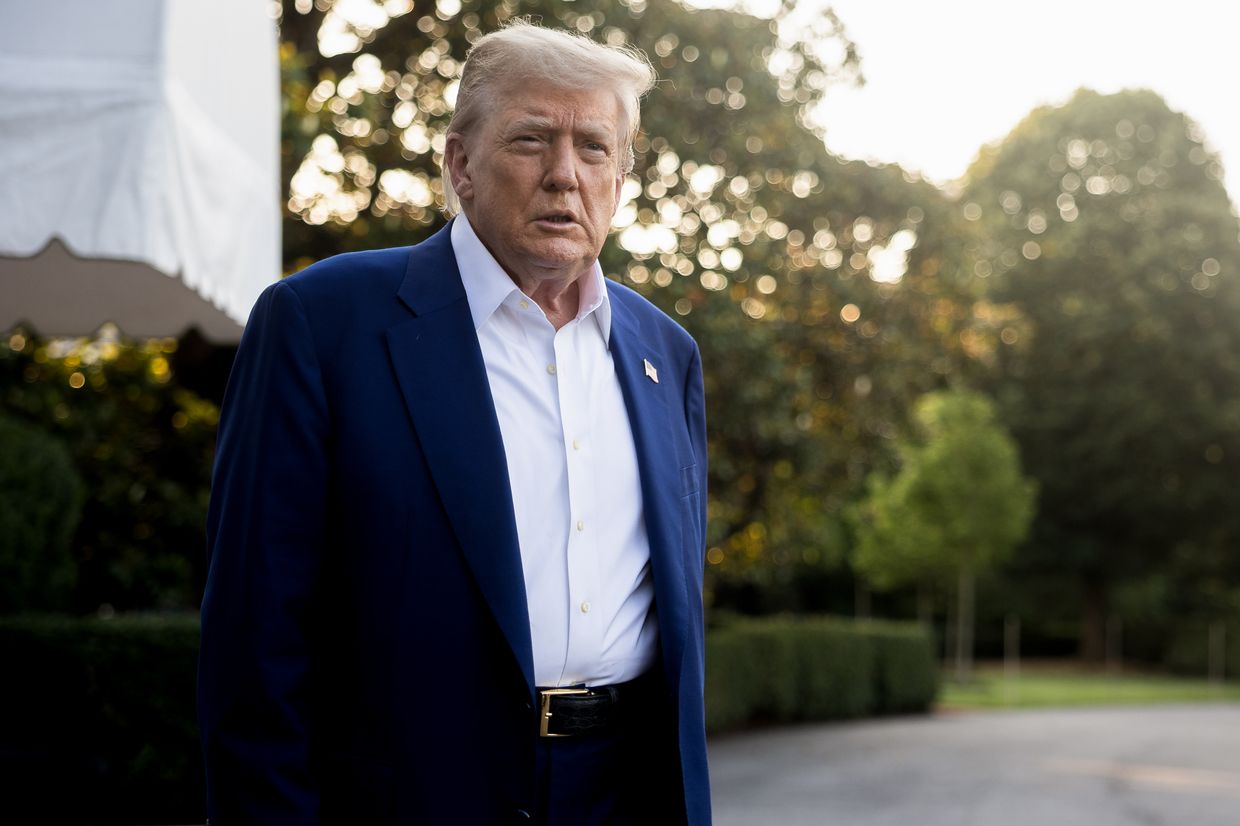


U.S. President Donald Trump is considering sending Ukraine an additional Patriot air defense system, a move that would mark his administration's first major weapons transfer to Kyiv, the Wall Street Journal (WSJ) reported on July 8, citing two defense officials.
The report is the latest in a series of contradictory messages from the Trump White House in recent days regarding military aid to Ukraine. While the Pentagon on July 2 announced a halt in weapons shipments to Kyiv due to dwindling U.S. stockpiles, Trump later claimed he wasn't responsible for the decision and wanted to send more weapons to Ukraine.
A U.S. defense official told the WSJ that Trump has asked the Pentagon to look into options for supplying Ukraine with more arms, including a Patriot air defense system. Officials are also reportedly exploring whether other nations can send Patriots to Kyiv.
The claim dovetails with recent media reports about the administration's plans to bolster Ukraine's air defenses. Axios reported on July 8 that the White House is pursuing a plan to have Germany sell another Patriot battery to Ukraine, with the U.S. and European allies splitting the cost of the purchase. Sources told the outlet that Trump also pledged to send 10 Patriot interceptor missiles to Kyiv.
If the U.S. provides Ukraine with an additional Patriot system, it would mark the first time Trump has approved a major military aid package to Kyiv that wasn't previously greenlighted by former U.S. President Joe Biden.
Washington has thus far provided Kyiv with three Patriots, a former Pentagon official told the WSJ. Germany has also sent three, while a group of European countries provided one. According to the official, not all systems are in use at the same time due to maintenance issues.
The U.S.-made air defense systems are in high demand around the world. Each system consists of two or three launchers, a radar, a command and control element, and interceptor missiles. Patriot missiles are also in short supply globally: Ukraine faces an urgent need for the munitions amid increased Russian aerial attacks, and the Guardian reported on July 8 that even the U.S. has only 25% of the interceptors required by its defense readiness plans.
According to one of the officials who spoke to the WSJ, the U.S. military would be able to supply an additional Patriot to Ukraine if ordered by the White House.
 The Kyiv IndependentAnna Fratsyvir
The Kyiv IndependentAnna Fratsyvir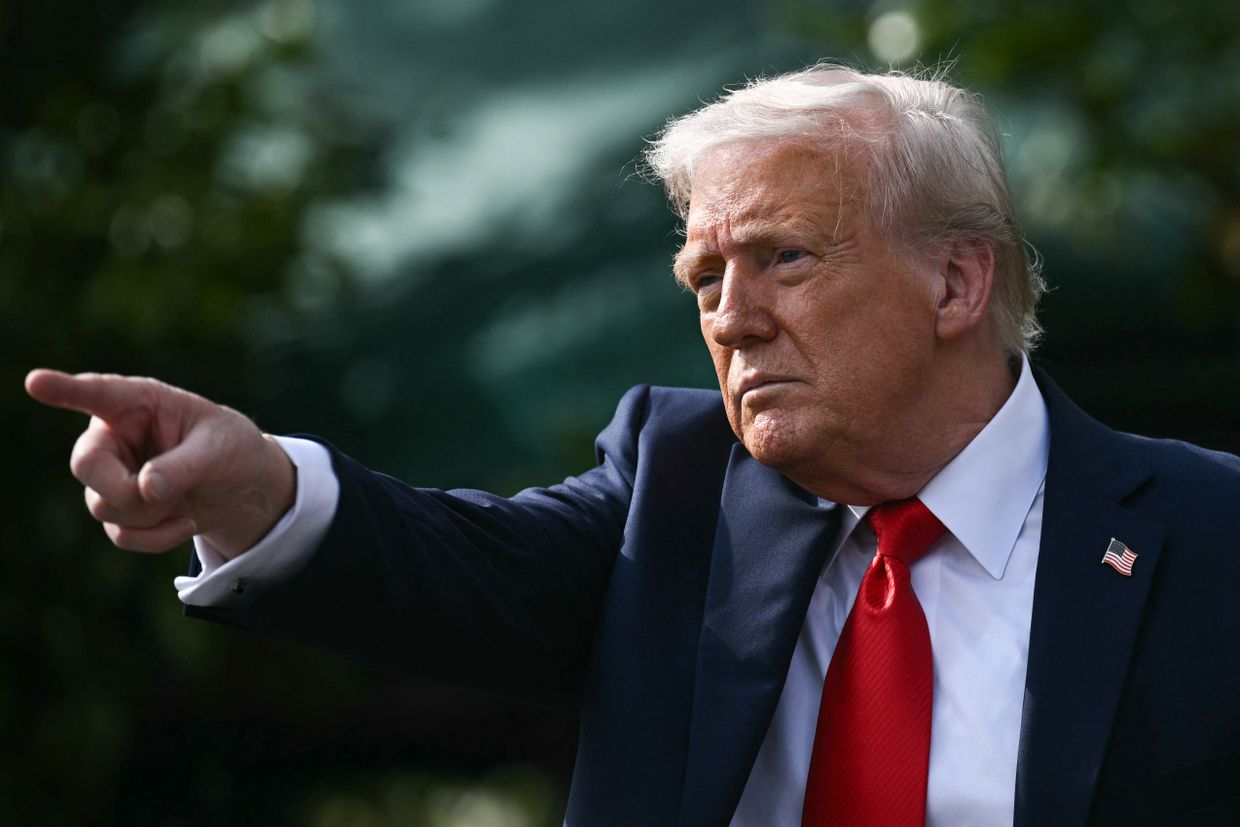


Ukraine has synchronized its sanctions against Russia with the last three packages of economic penalties imposed by the European Union, President Volodymyr Zelensky announced on July 8.
"Three more packages of EU sanctions are fully effective in Ukraine," Zelensky said in his evening address.
Earlier on July 8, the president announced a new round of sanctions, including restrictions on five Chinese-registered companies accused of supplying components found in Russian Shahed-type drones used to attack Ukraine.
Vladyslav Vlasiuk, Zelensky's sanctions commissioner, told reporters on July 8 that the latest decrees bring Ukrainian penalties in line with the EU's 15th, 16th, and 17th packages of sanctions against Russia.
The 15th package targets individuals from Russia, Belarus, and China, among other countries, according to Vlasiuk. It includes the Russian pilot Alexander Azarenkov, who was involved in the deadly attack on the Okhmatdyt children's hospital in Kyiv. Zelensky signed the sanctions decree on the one-year anniversary of the strike.
The 16th package includes individuals from Russia, China, Turkey, and other nations. It also targets the Voin Center, Russia's military-patriotic education organization operating in occupied Ukrainian territories, and Pivdennyi Flot LLC, which transports Russian oil via its "shadow fleet," Vlasiuk said.
The 17th package designates firms from Russia, China, Turkey, and other countries, including the gold-mining company Petropavlovsk and the Chinese company Skywalker Technology Co. Ltd, produce drone parts for Russia.
The EU is expected to approve its 18th package of sanctions against Russia later this week, after facing opposition from pro-Kremlin bloc members Slovakia and Hungary.
Ukraine has taken measures to coordinate sanctions with international partners in order to amplify pressure on Moscow. Zelensky on June 27 signed a decree to synchronize Ukraine's sanctions against Russia with those imposed by the EU and Group of Seven (G7).
 The Kyiv IndependentThe Kyiv Independent news desk
The Kyiv IndependentThe Kyiv Independent news desk


The European Commission is discussing with EU member states various options to cover Ukraine's budget deficit for next year, which could range from $8 billion to $19 billion, the Financial Times reported on July 8.
International partners have provided Ukraine with over $39 billion for its wartime economy so far this year, Prime Minister Denys Shmyhal announced.
The financial hole in Ukraine's budget is linked to reduced U.S. support and the lack of prospects for a swift ceasefire with Russia that Europe had hoped for, the Financial Times reported.
A senior EU official told the publication that many of Ukraine's partners had previously counted on a peace deal in 2025, but are now forced to revise their funding plans.
This includes the European Commission, which has already adjusted spending from Ukraine-related funding streams.
Without support from Western partners, Kyiv would face a budget deficit of $19 billion in 2026, according to the Financial Times. However, even if additional international financing for the wartime economy can be secured, a gap of at least $8 billion would remain.
To support Ukraine's budget, Europe is considering providing military aid in the form of off-budget grants that would be recorded separately as external transfers but would count toward NATO member countries' national defense spending targets.
One EU diplomat told the Financial Times that military support for Ukraine is viewed as a contribution to the defense of all of Europe.
In a document for G7 countries reviewed by Financial Times, Kyiv proposed that European allies co-finance Ukrainian forces, framing this as a service to strengthen continental security.
Other support options under discussion include potentially accelerating payments from the existing $50 billion G7 loan program and reinvesting frozen Russian assets in higher-yield financial instruments that the EU allocated to help service the debt.
According to the Financial Times, two sources confirmed that the commission planned to discuss these options with EU finance ministers on July 8.
The funding issue will also be raised at the Ukraine Recovery Conference in Rome on July 10-11, dedicated to Ukraine's reconstruction needs. European Commission President Ursula von der Leyen will attend the event.


Ukraine's current ambassador to the United States, Oksana Markarova, will be replaced in the near future, Foreign Minister Andrii Sybiha confirmed in an interview with Ukrainian Radio on July 8.
Earlier on July 8, a source in the Presidential Office told the Kyiv Independent that President Volodymyr Zelensky had informed Markarova of her pending dismissal.
"We can expect about 20 decrees dismissing and appointing new heads of foreign institutions," Sybiha said, specifically mentioning the U.S. as one of the planned replacements.
In his comments, Sybiha described Markarova as "one of our most successful ambassadors."
"She is extremely effective and charismatic, but surely every diplomat has a rotation cycle," he said. "I can confirm that the Ukrainian president's vision is to carry out rotations in all countries, both G7 and G20. That is, first and foremost, to strengthen these countries, in particular the U.S. track."
Zelensky and Sybiha on June 21 announced plans to overhaul Ukraine's diplomatic corps, teasing major personnel changes in a bid to secure better military aid packages and other support from international partners.
Zelensky discussed replacing Markarova specifically in a recent phone call with U.S. President Donald Trump, a source in the President's Office told the Kyiv Independent on July 7.
There are multiple "strong candidates" in the running to replace Markarova, the source said. Prime Minister Denys Shmyhal, Deputy Prime Minister Olha Stefanishyna, Defense Minister Rustem Umerov, and Energy Minister Herman Halushchenko are among the candidates, Bloomberg previously reported.
In his evening address, Zelensky said that a meeting with all Ukrainian ambassadors is scheduled for July 21. It was not immediately clear as to when the changes to the posts may take effect.
Markarova has served as Kyiv's ambassador to Washington since April 2021, and played a central role in coordinating U.S. military and financial support during the early phases of Russia's full-scale invasion.
The announcement of her dismissal comes at a high-stakes moment in relations between Kyiv and Washington. The U.S. Defense Department recently paused shipments of critical weapons systems, including Patriot air defense missiles and precision-guided munitions, even as Ukraine faces intensifying Russian attacks.
 The Kyiv IndependentAnna Fratsyvir
The Kyiv IndependentAnna Fratsyvir
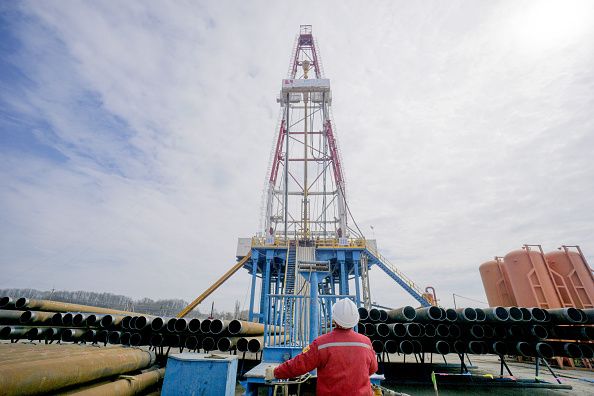

Ukraine's state energy giant Naftogaz has commissioned a new exploration well producing 383,000 cubic meters of natural gas per day through its subsidiary Ukrgazvydobuvannya, CEO Sergii Koretskyi announced on July 8.
The 5.7-kilometer deviated well was drilled and commissioned six weeks ahead of schedule as Ukraine works to boost domestic production amid Russian attacks on its energy infrastructure, including gas storage facilities in western Ukraine.
"This is a significant achievement, given the country's need for gas," Koretskyi said.
Naftogaz produces the lion's share of Ukrainian gas, but its production facilities were severely damaged in a series of Russian missile strikes earlier this year, reducing production by as much as 40%.
According to data from Naftogaz, Ukrgazvydobuvannya lost about 50% of its production due to shelling.
Ukrgazvydobuvannya managed to increase commercial gas production to 13.9 billion cubic meters (bcm) in 2024 compared to 13.2 bcm in 2023, commissioning 83 new wells despite wartime conditions.
Ukraine previously produced 52 million cubic meters daily before Russia's full-scale invasion, but required 110-140 million cubic meters during winter months, covering the shortfall from underground storage.
Russian strikes have repeatedly targeted Ukraine's gas infrastructure, including a February 11 combined missile and drone attack that damaged Naftogaz production facilities in Poltava Oblast.
To secure winter supplies, Naftogaz has signed four contracts with Poland's Orlen for delivery of 440 million cubic meters of U.S. liquefied natural gas. The latest agreement, announced July 2, covers an additional 140 million cubic meters.
According to Bloomberg estimates, in 2025 Ukraine may import a record 5 billion cubic meters of gas from Europe.
Ukraine's gas storage situation has also deteriorated significantly, with underground reserves falling to 6.02 bcm as of May 11 — the lowest level in at least 11 years.
The facilities are operating at just 19.4% capacity, with 2.79 billion cubic meters less gas available than the previous year.
 The Kyiv IndependentDominic Culverwell
The Kyiv IndependentDominic Culverwell
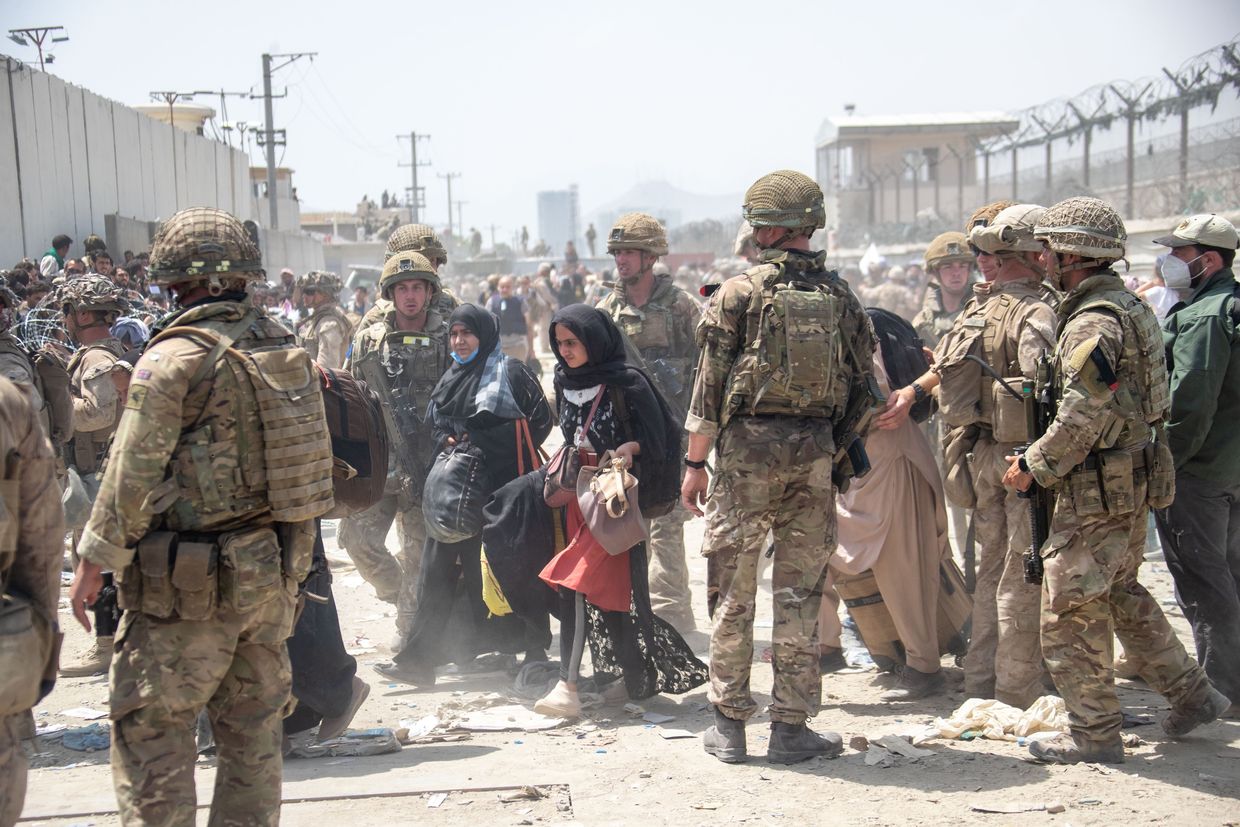

The International Criminal Court (ICC) said on July 8 that it had issued arrest warrants for two senior Taliban leaders, accusing them of crimes against humanity and gender-based persecution following the group's takeover of Afghanistan in 2021.
The move follows Russia's recognition of the Taliban as Afghanistan's legitimate government on July 3. Russia, which had previously designated the Taliban as a banned terrorist group, became the first country in the world to recognize it.
In a statement, the ICC named Taliban supreme leader Haibatullah Akhundzada and Afghanistan's top judge Abdul Hakim Haqqani as suspects in a campaign of systematic oppression targeting women, girls, and others who do not conform to the group's rigid gender ideology.
The court said the alleged crimes took place across Afghanistan from the Taliban's return to power on August 15, 2021, and continued at least until Jan. 20, 2025. The suspects are believed to have played key roles in the enforcement of Taliban policies that led to "murder, imprisonment, torture, rape and enforced disappearance."
The persecution was not limited to women and girls, according to the ICC. The court said that men perceived as allies of women or opponents of Taliban ideology were also targeted.
The ICC emphasized that the Taliban implemented a state-led policy of repression that violated fundamental human rights and freedoms across the country.
Most of the international community has refused to formally recognize the Taliban regime due to its human rights abuses and failure to meet international standards.
Meanwhile, since Moscow's full-scale invasion of Ukraine in 2022 the Kremlin has deepened relationships with authoritarian regimes, including North Korea, Iran, and now the Taliban. Russia has expanded trade with Afghanistan and allowed Taliban officials to participate in Russian forums.
In December 2024, the Russian State Duma passed a law allowing certain groups, including the Taliban, to be removed from the country's list of banned terrorist organizations. The move paved the way for official recognition.
Putin has referred to the Taliban as "allies," and Lavrov has called them "sane people," despite the group's ongoing enforcement of strict Islamic law, including gender apartheid, public executions, and bans on women's education.
 The Kyiv IndependentDr. Gary E Myers
The Kyiv IndependentDr. Gary E Myers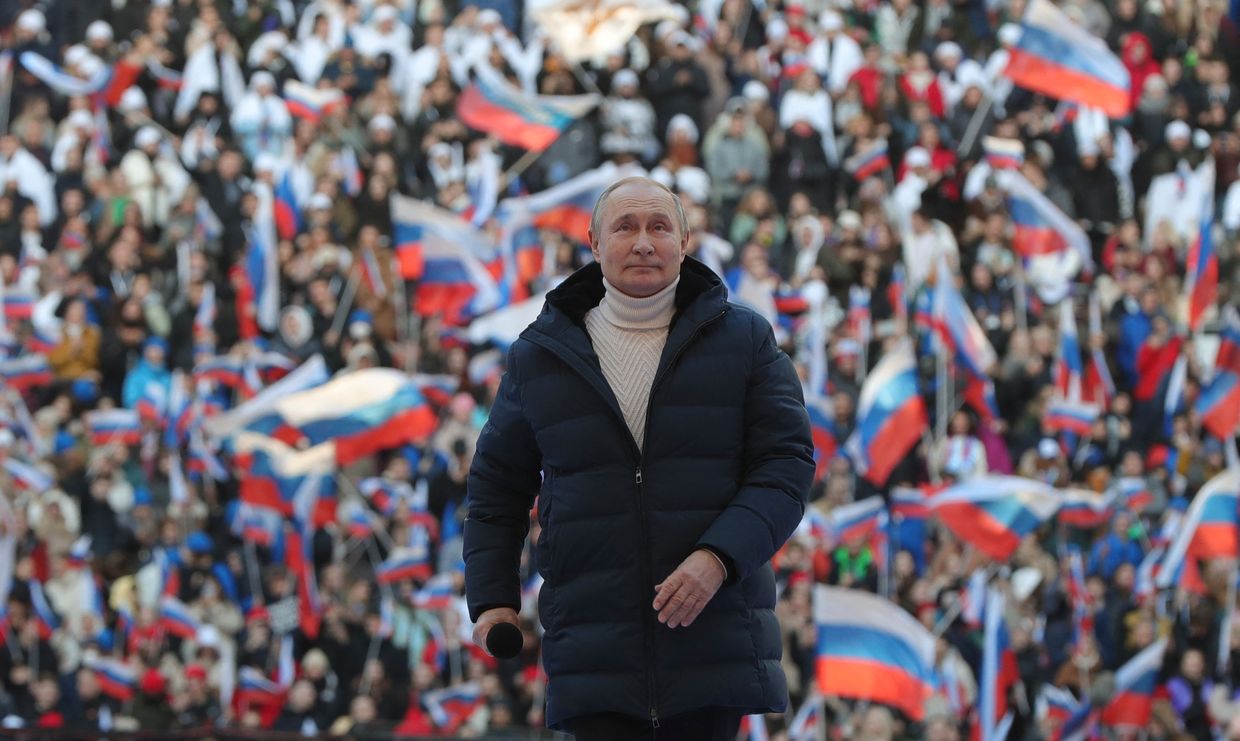
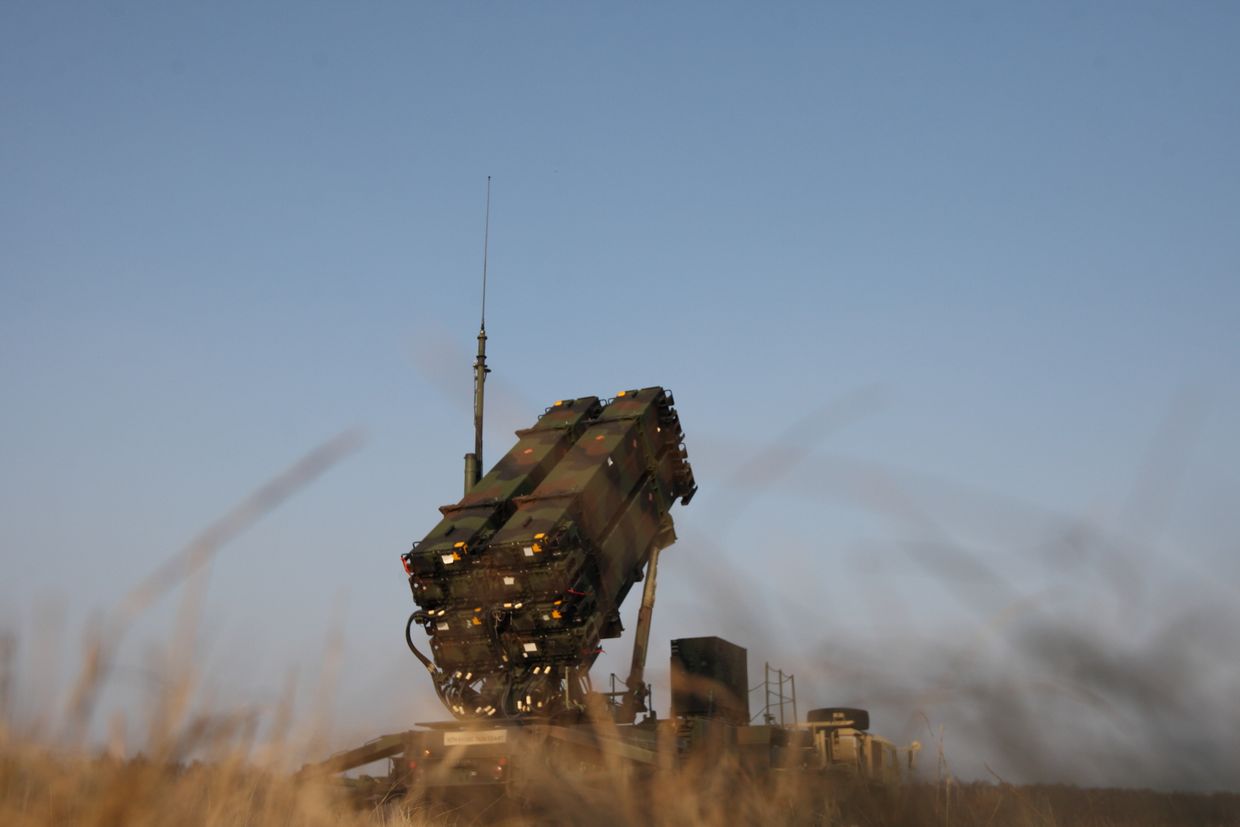

The United States has only about 25% of the Patriot missile interceptors it needs to meet Pentagon military plans, a shortage that led U.S. President Donald Trump's administration to pause a major transfer of weapons to Ukraine, the Guardian reported on July 8.
The decision to halt the delivery, made on July 2, followed an internal review showing low stockpiles of critical air defense systems. The depletion was largely due to recent U.S. operations in the Middle East, including the interception of Iranian missiles after strikes on the American Al Udeid airbase in Qatar, according to the Guardian.
According to officials familiar with the matter, the Pentagon's munitions tracker, used to measure the minimum supplies needed for U.S. war plans, showed Patriot interceptor levels had fallen below acceptable levels. That prompted concerns that sending more to Ukraine could put U.S. defense readiness at risk, the Guardian wrote.
The freeze reportedly affected Ukraine's two key arms transfer methods: drawdowns from Pentagon stockpiles and the Ukraine Security Assistance Initiative (USAI), through which the Defense Department orders new weapons from contractors.
Because U.S. orders take priority, Ukrainian requests for new weapons, including Patriot missiles, face years-long delays.
The pause came at a critical time for Kyiv, as Russia intensifies large-scale aerial attacks on Ukrainian cities. With limited options to acquire precision-guided and other key munitions, Ukrainian forces have increasingly relied on Western-supplied air defenses to counter the growing threat.
For its latest aid package, the U.S. had planned to send dozens of Patriot interceptors, along with Hellfire missiles, air-to-air Sparrows, GMLRS rockets, and anti-tank weapons, according to the Guardian.
NBC News reported on July 4 that U.S. Defense Secretary Pete Hegseth unilaterally halted a weapons shipment to Ukraine despite internal military assessments showing the aid would not compromise American military readiness.
The assessment concluded that while some munitions stockpiles, including precision weapons, were low, they had not fallen below critical thresholds.
Amid the ongoing questions over Washington's weapons pause, Trump has apparently promised to send 10 Patriot interceptors to Ukraine, Axios reported on July 8. Sources also told the Wall Street Journal (WSJ) that Trump claimed he wasn't behind the decision to halt arms to Kyiv in a recent phone call with President Volodymyr Zelensky.
 The Kyiv IndependentVladyslav Bandrovsky
The Kyiv IndependentVladyslav Bandrovsky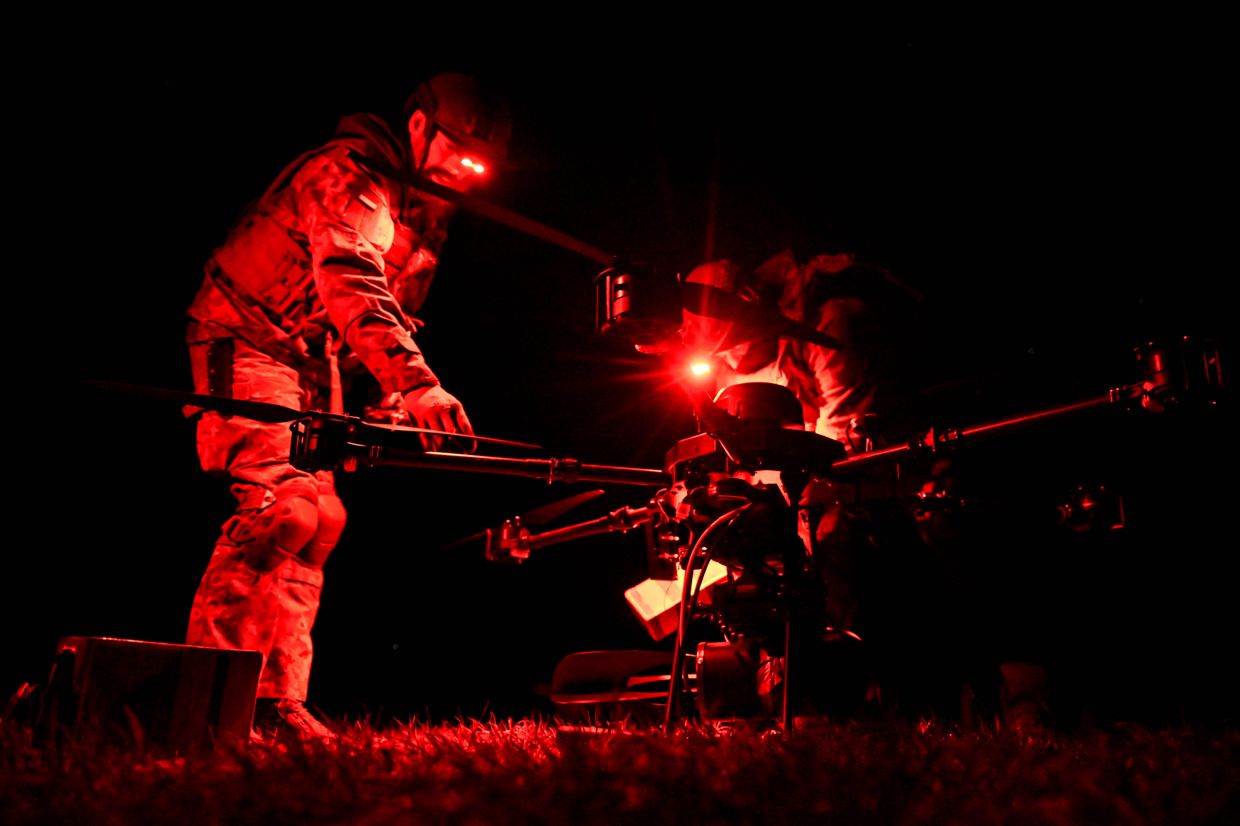


U.S. President Donald Trump said on July 8 he was "not happy" with Russian President Vladimir Putin.
"We get a lot of bullsh*t thrown at us by Putin," he said at a cabinet meeting. "He's very nice all the time, but it turns out to be meaningless."
Trump has vacillated for months between criticizing Putin and praising the Kremlin. So far, he has failed to increase military aid to Ukraine or sanction Russia despite Moscow's refusal to accept a ceasefire.
During his election campaign, Trump repeatedly pledged to end the war in Ukraine within "24 hours." However, his efforts to broker a peace deal between Ukraine and Russia have seen no progress.
Trump also addressed U.S. legislation on sanctions, saying the Senate's Russia sanctions bill was "totally optional" for him to implement or terminate.
"I'm looking at it very strongly," Trump said.
The bill would impose 500% tariffs on imports from countries purchasing Russian oil, gas, uranium, and other products. It was introduced in April but has seen no progress since then.
Earlier, Trump signaled growing openness to tougher measures against Moscow, ABC News reported on June 29.
According to Senator Lindsey Graham, Trump privately told him it was "time to move" the Russia sanctions bill.
"I’m confident the president is ready for us to act," Graham said.
The Senate is expected to vote on the bill after Congress returns from a break in July.
"(Putin is) killing a lot of people — his soldiers and their soldiers mostly. And it's now up to 7,000 a week," Trump said on July 8, referring to Russia's battlefield losses.
In recent weeks, Trump has been critical of the Russian president. Following a phone call with Putin on July 3, Trump said he was "very disappointed," signaling growing frustration with the Kremlin.
When asked by a journalist on July 8 whether he would take action, Trump responded: "Wouldn't be telling you... We want to have a little surprise."
Trump also commented on the the current pause in weapons deliveries to Ukraine. He pointed to the previous transfer of advanced systems, including Javelin anti-tank missiles and Patriot air defense systems, calling them "the best equipment in the world."
His remarks come after the United States halted military aid shipments to Ukraine on July 2 amid an internal Pentagon review of stockpile capacity. The freeze coincided with a surge in Russian aerial attacks, leaving Ukraine increasingly vulnerable amid a shortage of U.S.-supplied air defense systems.
The U.S. halted weapons shipments to Ukraine amid a capability review, the White House and Pentagon previously confirmed, with Trump later denying the pause.
On July 7, the Pentagon said it would renew shipments, saying the additional defensive weapons were intended to help Ukraine protect itself while the U.S. works toward "a lasting peace."
 The Kyiv IndependentAsami Terajima
The Kyiv IndependentAsami Terajima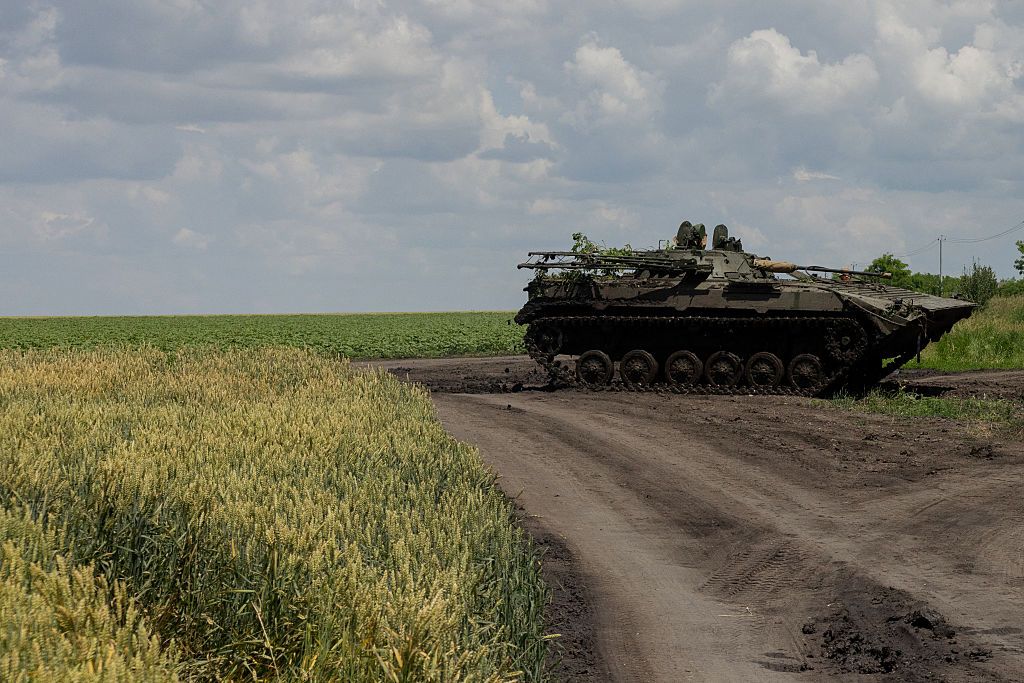
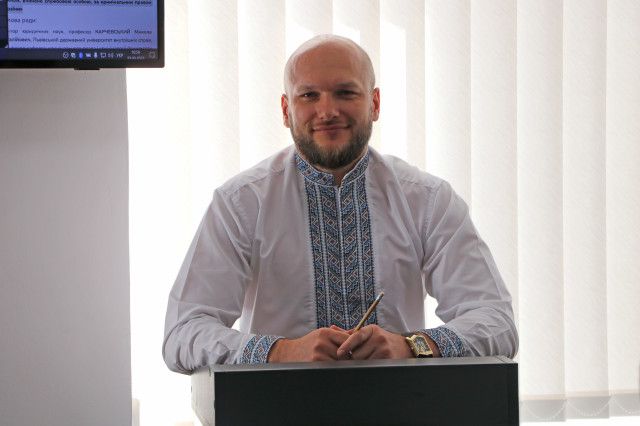

Ukraine's Cabinet of Ministers rejected a nominee to lead the economic crimes agency, drawing swift criticism from lawmakers and businesses over alleged interference in the selection process.
The agency, the Bureau of Economic Security, was created in 2021 to investigate economic crimes. It has since faced accusations of being used to pressure — and in some cases extort — businesses, prompting multiple calls and efforts to overhaul it.
Selecting a new director of the agency by the end of July is one of Ukraine's obligations to the EU and International Monetary Fund as part of international financing packages extended to the war-torn country by the institutions.
As part of a recent attempt to relaunch the bureau, Oleksandr Tsyvinsky on June 30 was officially nominated by the bureau's selection commission that consists of six members — three from the government and three international experts. Tsyvinsky is known for exposing schemes involving illegal land seizures in Kyiv..
But Ukraine's government on July 8 said it had rejected Tsyvinsky following alleged concerns raised by the country's intelligence service of potential Russian connections.
The government unanimously decided to ask the commission to submit two new candidates who meet all security requirements, the government press service wrote on its official Telegram channel, a move it claims aligns with the law.
Following Tsyvinsky's nomination, it was revealed that his father holds a Russian passport. He has said he hasn't spoken to his father, who lives in Russia, in years.
Tsyvinsky holds clearance for state secrets and has passed special vetting, backed by over 20 years in law enforcement, including nearly a decade at the National Anti-Corruption Bureau of Ukraine (NABU).
Opposition lawmaker Yaroslav Zhelizniak, said the government had no grounds to reject a properly nominated candidate, claiming President Volodymyr Zelensky's office is behind the blocking of the nomination.
"The (bureau's) legislation provides no legal grounds for the cabinet to demand a new shortlist or impose additional, undefined requirements such as 'security criteria.' The term itself is absent from any statute and therefore has no legal force," Zhelizniak said.
"The SBU letter in this case is nothing more than an indicator of the winner's disloyalty to the President's Office and a desire to block the appointment," said Olena Shcherban, deputy executive director of the AntAC in a statement following the news.
Major business associations have called on Zelensky, Parliament Speaker Ruslan Stefanchuk, and Prime Minister Denys Shmyhal to reverse the government's decision.
The business groups warned that failing to reform the agency will harm investment decisions, particularly as Ukraine's wartime economy needs to attract capital.
"War is a time for radical changes in the rule of law and business climate, otherwise the economy cannot ensure the country's survival," the businesses wrote in an open letter.
 The Kyiv IndependentLiliane Bivings
The Kyiv IndependentLiliane Bivings


Russia's crude oil shipments have dropped to their lowest level since February, as refinery processing outpaces production growth and trims available export volumes, Bloomberg reported on July 8.
Russia has used its revenues from energy exports to finance the war in Ukraine.
Seaborne crude flows averaged 3.12 million barrels a day over the four weeks to July 6, a 3% decline from the previous period ending June 29, according to tanker-tracking data compiled by Bloomberg. That's the lowest level recorded since the four-week period ending Feb. 23.
The gross value of Moscow's oil exports rose by about $100 million, or 8%, to $1.36 billion for the week ending July 6, Bloomberg said. That increase was due to higher volume, although average export prices declined for a second consecutive week.
Most of Russia's oil continues to head to Asia. Shipments to the region averaged 2.73 million barrels per day, slightly lower than the previous month. Flows to Turkey fell to 370,000 barrels a day, and shipments to Syria held steady at 25,000 barrels a day.
The European Union is seeking to tighten sanctions on Russia. Ambassadors have yet to approve the EU's 18th sanctions package due to opposition from Hungary and Slovakia. The bloc failed to adopt the new package on June 27.
The new package includes restrictions targeting Russia's energy and banking sectors, as well as transactions linked to the Nord Stream gas pipeline.
 The Kyiv IndependentTim Zadorozhnyy
The Kyiv IndependentTim Zadorozhnyy
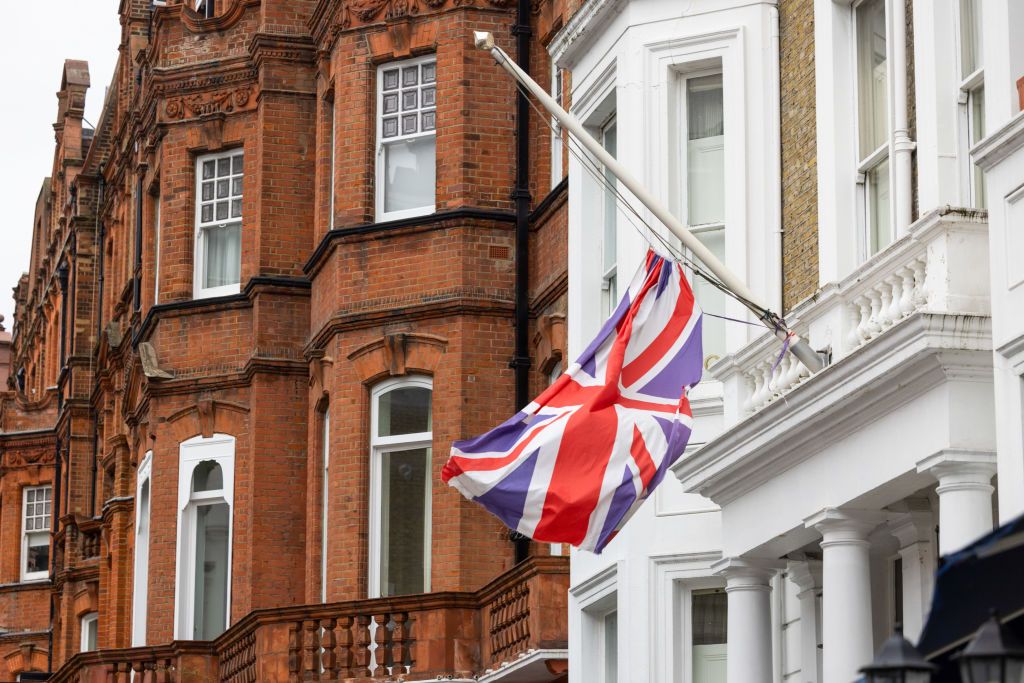

Three men were found guilty on July 8 in connection with an arson attack on Ukraine-linked businesses in London, which British authorities say was orchestrated by Russia's Wagner mercenary group, Reuters reported.
The alleged ringleader, Dylan Earl, 21, had already pleaded guilty to aggravated arson over the 2024 blaze targeting companies that were supplying Elon Musk's Starlink satellite equipment to Ukraine, according to Reuters.
The systems are considered vital to Ukraine's communications and defense against Russia's ongoing invasion.
Earl also became the first person convicted under the U.K.'s National Security Act after admitting to a separate plot to attack a wine shop and restaurant in London’s upscale Mayfair district and to kidnap its owner, a prominent critic of Russian President Vladimir Putin.
Two others, Jake Reeves, 23, and Earl’s associate, also pleaded guilty to aggravated arson, with Reeves admitting to a charge under the National Security Act for receiving a material benefit from a foreign intelligence agency.
A jury at London's Old Bailey court convicted three additional men, Nii Kojo Mensah, 23, Jakeem Rose, 23, and Ugnius Asmena, 20, of aggravated arson. They had denied the charges. A fourth man, Paul English, 61, was acquitted.
Two other defendants, Ashton Evans, 20, and Dmitrijus Paulauskas, 23, were charged with failing to disclose knowledge of terrorist activity. Evans was convicted on one count and cleared of another. Paulauskas was acquitted of both charges and reportedly broke down in tears as the verdict was read.
Commander Dominic Murphy of the London Metropolitan Police reportedly said he was confident the Wagner Group and the Russian state were behind the attacks.
The U.K. has designated the Wagner Group as a terrorist organization.
Earl had exchanged hundreds of encrypted messages with a supposed Wagner handler using the alias "Privet Bot" on Telegram. According to reporting by the Organized Crime and Corruption Reporting Project (OCCRP), the account was previously advertised by Grey Zone, a Wagner-affiliated channel.
Prosecutors said Earl expressed interest in fighting for Wagner and was encouraged to recruit contacts from British soccer hooligan networks, Irish republican groups, and organized crime circles, Reuters reported. He and Evans also admitted to unrelated charges of dealing cocaine.
The Russian Embassy in London has denied any involvement in the warehouse attack and accused the British government of blaming Russia for domestic issues.
The Kremlin has consistently rejected accusations of sabotage and espionage, despite growing evidence and convictions tied to Russian-linked operations across Europe.
 The Kyiv IndependentLiliane Bivings
The Kyiv IndependentLiliane Bivings